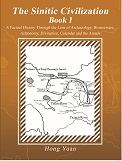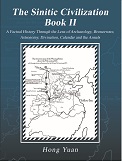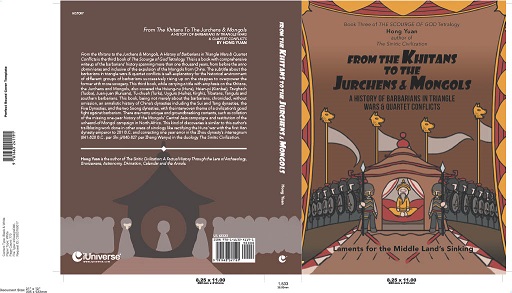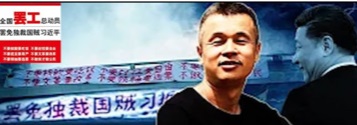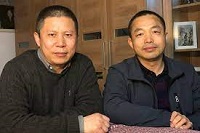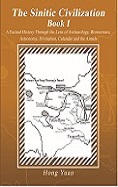
Sinitic Civilization-Book 1
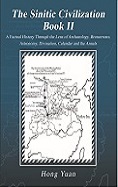
Sinitic Civilization-Book 2
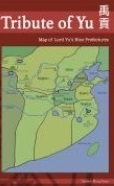
Tribute of Yu

Heavenly Questions
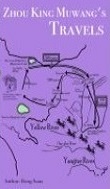
Zhou King Muwang's Travels
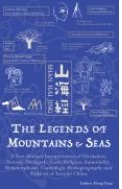
The Legends of Mountains & Seas
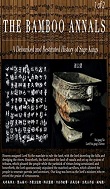
The Bamboo Annals - Book 1
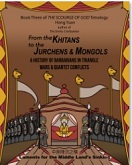
The Scourge-of-God-Tetralogy:
From the Khitans to the Jurchens & Mongols: A History of Barbarians in Triangle Wars and Quartet Conflicts
(available at iUniverse;
Google;
Amazon;
B&N)
|
|
THE SOUTH-NORTH DYNASTIES
Continuing the section on The Sixteen Nations would be the time period called by the South-North Dynasties. Most historians classified it as the Southern-Northern Dynasties to emphasize that both the northern and southern dynasties were part of one whole China. The division between the two time periods will be the demise of the Eastern Jinn Dynasty (A.D. 317-420) and the usurpation by Eastern Jinn General Liu Yu.
The Hunnic-Xianbei rebellion against the Western Jinn Chinese led to the turmoil in northern China called 'The Sixteen Nations' or 'Five Nomadic Groups Ravaging China'. The rebellion was the result of internal turmoil among the Jinn Chinese princes. The late Jinn China period was known as the 'Turmoil of the Eight Sima Kings' because the eight Jinn princes were named Sima, carrying the last character 'ma' (meaning 'horse'). When the Sima princes almost finished off each other, a border general at today's Beijing, Wang Jun, colluded with the Xianbei in the attempt of fighting the Jinn Court. Liu Yuan, a Hun hostage at the Jinn Court, was released for organizing the anti-Xianbei forces among the Southern Huns. Soon after that, Liu Yuan proclaimed the founding of the Hunnic Han Dynasty (A.D. 304-329), and went on to route the two Jinn capitals of Luoyang and Xi'an, respectively. A Jiehu barbarian under the Hunnic Han (alternatively named Zhao) Dynasty would set up the Posterior Zhao Dynasty. Ran Min, an adopted son of Shi Le, would kill all Jiehu and set up a Wei Dynasty, alternatively called the Ran Wei dynasty. Some Chinese general on the Silk Road would set up Anterior Liang (A.D. 317-376). A Xianbei by the name of Murong Jun would rebel against Ran Min's Ran Wei, caught Ran Min, and set up Anterior Yan (A.D. 337-370). Murong Jun's brother, Murong Chui, would defeat the northern expedition led by Eastern Jinn China's Huan Wen, but Murong Chui was not trusted by the nephew emperor. Hence, Murong Chui fled to Fu Jian's Di (1) nomads. Fu Jian, whose ancestor served under Jiehu's Posterior Zhao, set up Anterior Qin (A.D. 351-394).
The Tuoba Xianbei at one time controlled the northern frontier in three blocs, with Tuoba Yilu (r. A.D. 295-307, 307-316) in control of the western segment around Dingxiang.
This was an arrangement by uncle Tuoba Luguan (r. A.D. 294-307) in A.D. 295, with Tuoba Luguan himself controlling the domain to the north of Shanggu and west of Ruyuan (origin of Ru[2]-shui River in Wanxian of Hebei).
Tuoba Luguan was said by Wei Shu to have over 400,000 bowmen cavalry.
Tuoba Yulü (r. A.D. 316-321)
attacked west to take the ancient Wusun territory in Central Asia,
as well as attacked east to take over the Wuji land in Manchuria.
History annals claimed that Tuoba Yulü controlled one million bowmen cavalry.
In A.D. 321, Tuoba Yiyi's widow Wei-shi, i.e., Tuoba Pugen's mother, staged a coup to get Tuoba Yulü and some dozen nobles killed.
Tuoba Shenyijian (A.D. 318-376, r. A.D. 338-376) inherited the title of King Dai-wang from brother Tuoba Yihuai (r. A.D. 329-338) after serving as a hostage in Posterior Zhao.
Tuoba Shenyijian later in A.D. 340 relocated to Shengle (Helin-ge'er of Inner Mongolia), with domain extending to Huimo to the east, and Poluona (Bahanna/Pohan at Xijian-cheng city or Akhsikent of Uzbekistan in Xin Tang Shu) to the west.
In A.D. 371, junior prince Tuoba Shi, i.e., father of future posthumously-born Tuoba Wei Emperor Tuoba Gui, died of wounds incurred in stopping assassin Zhangsun Jin against father Tuoba Shenyijian during a banquet two months earlier.
In A.D. 376, under Tuoba Shenyijian's attack, Liu Weichen requested relief with Fu Jian's Anterior Qin.
Anterior Qin launched a campaign against the Dai-guo state,
with
Fu Luo, Li Rou, and Zhang Hao commanding the Qin army.
Tuoba Shenyijian's subordinate tribes, like
the Bai-bu (white) Xianbei tribe,
Dugu tribe and Liu Kuren's tribe,
failed to stop the Qin army, and fled with their tribes to the north of Yinshan Mountain.
When the Gaoche tribes pincer-attacked Tuoba Shenyijian's Tuoba,
Tuoba Shenyijian returned south to Mo-nan (southern deserts).
At that time, Tuoba Shenyijian fell ill.
Tuoba Jin, i.e., Tuoba Gu's son, instigated
prince Tuoba Shijun for coup against his father with a claim that
Tuoba Shenyijian
wanted to make prince Tuoba Yanpo, a Murong woman-born brother,
into the successor.
Tuoba Shijun killed father Tuoba Shenyijian (A.D. 318-376, r. A.D. 338-376), brother Tuoba Yanpo, et al.
The Qin army
took the opportunity to destroy the state of Dai-guo.
Fu Jian divided up the Dai-guo land, with the territories to the west of the Yellow River assigned to Liu Weichen Weichen (r. A.D. 359-391), who was father to Hunnic Xia dynasty's founder Helian Bobo (A.D. 381-425, r. A.D. 407-425).
Fu Jian defeated Anterior Yan (A.D. 337-370) in A.D. 370.
In A.D. 371, Fu Jian of Anterior Qin Dynasty conquered the Qiuchi Di state, and took over the Sichuan basin in A.D. 373.
Anterior Qin continued on to take out
Anterior Liang and
Tuoba's Dai-guo state in A.D. 376.
The Tuoba people were divided between two tribes ruled by Liu Kuren and Liu Weichen, with young Tuoba Gui allowed to stay with mother Heh-shi who left the Helan tribe for the Dugu tribe that was subject to Liu Kuren
together with 'nan-bu (southern tribe) da-ren' Zhangsun Song.
Fu Jian, in order to reunite China, launched a war against Eastern Jinn against death-bed objection from counselor Wang Meng, while in A.D. 382 dispatching Lü Guang against the Western Territories with an army of 75,000.
As a result of the collapse of the barbarian allied army's campaign against the Eastern Jinn court at the A.D. 383 Battle of Fei-shui, Anterior Qin collapsed.
After the fall of Di's Anterior Qin, the Xianbei re-established Posterior Yan (A.D. 384-409), i.e., the seventh state among the sixteen nations, and the Qiangs would set up Posterior Qin (A.D. 384-417).
Taking advantage of uncle Murong Chui's Posterior Yan rebellion in Hebei, two brothers Murong Hong and Murong Chong combined forces and launched Western Yan (A.D. 384-386, 386-394), which was not listed among the sixteen nations.
Liu Kuren, who allied with the Posterior Qin army against Posterior Yan, was killed by Mu Yuwen in A.D. 384. Liu Kuren's younger brother Liu Toujuan took over the control. In A.D. 385, Liu Xian, i.e., Liu Kuren's son, killed Liu Toujuan.
Among the Western Xianbei, Qifu would set up Western Qin (A.D. 385-400, 409-431), and Tufa would set up Southern Liang[2] (A.D. 397-414).
After the death of Fu Jian in A.D. 385, Lü Guang launched Posterior Liang (A.D. 386-389, 389-403) at Guzang (Wuwei, Gansu).
Numerous statelets, like Posterior Liang, Northern Liang, Southern Yan, Western Liang, Hunnic Xia (i.e., Western Xia dynasty 407-431) and Northern Yan would follow.
The Southern Chinese had staged quite a few northern campaigns. Zu Ti (Zu Di), organizing the refugees and civilians with minimal Eastern Jinn Court support, would cross the Yangtze to mount a campaign against the barbarians in northern China. General Huan Wen would continue the campaigns to the north.
Huan Wen met Wang Meng who later served Anterior Qin ruler (Fu Jian).
Huan Wen stopped short of finishing off the barbarians while contemplating on a return to southern China for usurping the Jinn court.
Similarly, Liu Yu, who had organized the strong fighting force called by the 'bei-fu jun', namely, the army troops consisting of the descendants of the Chinese from the northern Chinese prefectures, had at one time taken over the old capital city of Chang'an but then left for southern China for sake of usurping the Jinn court (A.D. 317-420).
Eastern Jinn Dynasty's army, under general Liu Yu, renewed northern expeditions and destroyed the Posterior Qin Dynasty of the Qiangs (A.D. 384-417) in Xi'an and Southern Yan Dynasty of Xianbei (A.D. 398-410) south of the Yellow River area.
General Liu Yu first attacked the Xianbei in today's Jiangsu-Shandong provinces, and then attacked the Qiangs in today's Luoyang-Xi'an areas. However, General Liu was eager to return to today's Nanking to usurp the Jinn Dynasty (A.D. 317-420).
His army in the Luoyang-Xi'an areas were defeated by the Hunnic Xia (A.D. 407-431). The Hunnic Xia, however, would soon be replaced by the Tuobas who had steadily built up their power base in today's Shanxi-Hebei areas. The Hunnic Xia had once requested aid from another Hunnic people, the Ruruans in the Altai Mountains, but the Tuobas had been able to defeat them both.
In January of A.D. 386, Tuoba Gui, namely, Tuoba Wei Emperor Daowudi (r. A.D. 386-409) and a grandson of Tuoba Shenyijian, declared the founding of the Dai-guo (i.e., Dai dynasty) and the Dengguo (ascending to the state) Era.
Tuoba Gui obtained the support of the Helan tribe, and relocated from Niuchuan (ox river plains) to Shengle of the former Dai-guo territory. Three months later, he renamed himself to King Wei-wang of the Wei Dynasty, with the capital set at Shengle. The Wei-wang king title derived from conferral from Posterior Yan.
Tuoba Xianbei were surrounded by enemies, with the Helan tribe in the north, the Dugu tribe in the south, the Kumo-Xi tribe in the east, the Hunnic Tiefu tribe in the Hetao sheath area in the west, the Ruruan (Rouran) and Gaoche tribe in the Mo-bei Desert to the north of Yinshan Mountain, and two Xianbei Yan states along the two sides of the Taihang Mountain, i.e., Murong Chui 's Posterior Yan to the east of Taihang and Western Yan established by Murong Chui and Murong Yong's Western Yan to the west. Tuoba Gui defeated uncle Tuoba Kudu who colluded with Liu Xian by allying with Posterior Yan.
At Gaoliu, Tuoba Gui, with the support of Murong Lin's Posterior Yan army, defeated uncle Tuoba Kudu who fled across the river into the Tiefu Hunnic territory where he was killed by Liu Weichen.
In the subsequent years, Tuoba Gui defeated Liu Xian who fled to Western Yan for asylum.
Then Tuoba Gui defeated the Kumo-Xi tribe.
In A.D. 388, Tuoba Gui defeated the Gaoche tribes.
In A.D. 389, Tuoba Gui defeated Yuanhe at the Luhun-hai Lake, a subtribe of the Gaoche tribes, with capture of over 200,000 people and cattle.
Yuanhe was taken by the later Uygurs as ancestors.
Thereafter, Tuoba Gui, together with Murong Lin's Posterior Yan army, defeated the tribes of Helan, He-tulin and He-xi.
When the Tiefu tribe attacked Helan, Heh Ne's Helan tribe surrendered to Tuoba Gui and relocated to the east of the Yellow River.
In A.D. 391, Tuoba Gui attacked the Ruruans, and using horse as meat and grains, pursued the Ruruans to Nanchuang (southern bed) Mountain where he captured half of the Ruruan tribe. Tuoba Gui continued to pursue the Ruruans, forcing chieftain Yunheti to surrender. After that, Tuoba Gui turned south to attack Tiefu, and captured the Dailai fort, with Liu Weichen killed by subordinates. Tuoba Gui captured and killed more than 5,000 Tiefuclan members and threw the bodies into the Yellow River. After this, Tuoba Gui subdued all tribes south of the Yellow River.
From A.D. 391 onward, Tuoba Gui began conflicts with Posterior Yan, starting with joint intervention in the Helan tribe's internal feuds betweebn Heh Ran'gan and Heh Ne, and the detention of Tuoba Gu by Posterior Yan.
Tuoba Wei allied with the Western Yan against the Posterior Yan.
Murong Chui in A.D. 394 attacked Western Yan,
besieged and sacked the Changzi city before
Tuoba Gui sent ove the relief army commanded by Tuoba Qian and Yu Yue. Murong Yong and more than thirty ministers, generals and royals were killed.
In A.D. 395, Northern Wei invaded Posterior Yan. Murong Chui sent Murong Bao on a counter attack, with Tuoba Gui retreating to west of the Yellow River.
Posterior Yan, at Wuyuan, took over more than 30,000 households from various Tuoba Wei state. The two sides confronted each other along the Yellow River,
with Posterior Yan collecting grains and building ships. Tuoba Gui sent Xu[3] Qian to request reinforcements from Posterior Qin while sending troops to the hind of the Posterior Yan army to intercept messnegers between the Yan army at the front and the capital city at Zhongshan. Faking the news that Murong Chui was ill and dying at Zhongshan, Tuoba Gui demoralized the Yan army after confronting along the river from September to October, which led to Murong Bao's issuing the order to burn the ships for retreat.
While the Yan army was retreating,
the Yellow River gradually got frozen under the gusty winds.
Subsequently, Tuoba Gui ordered more than 20,000 cavalry to cross the river to pursue the Yan army. The Wei army defeated the Yan army at Shenhebei (Shenhepi/Canhebei, pond slope of 'can-he' [feats and virtues mixing up]/Dai-hai Lake in Liangcheng of Inner Mongolia) and captured a large number of Yan army soldiers and officials. Tuoba Gui, except for retaining talented people such as Jia Run and Jia Yi, et al., and releasing some officials, ordered the Yan army troops massacred.
In March of A.D. 396, Posterior Yan attacked Tuoba Wei to avenge on the Sanhebei debacle, crossed the Qingling Ridge (mount Wuhui-shan in Yixian) to take Tianmen (heavenly gate, Laiyuan) for Yunzhong-jun. Murong Nong and Murong Bao, as herald troops, took the path of the Lieling Ridge (hunters' ridge, i.e., mount Xiawu-shan in Daixian) and sacked Pingcheng (Datong) where Tuoba Qian was killed. Murong Chui (Emperor Chengwudi, r. A.D. 384-396) died of sadness over the Yan troops' corpses at Sanhebei, and Murong Bao stopped chasing Tuoba Gui and turned around at Yunzhong. Son Murong Bao (r. A.D. 396-398) took over the Posterior Yan throne. At the time, Posterior Yan possessed five strategic points of Zhongshan, Longcheng, Ye, Jinyang and Ji[4]. Months after Murong Chui's death, Tuoba Gui continued the wars against Posterior Yan. Tuoba Gui led a Northern Wei army of more than 400,000 to attack and sack Jinyang. The Wei army then mounted multiple routes to attack Ye, Xindu, and Zhongshan, with Tuoba Yi to attack Ye, Wang Jian and Li Li[4] to attack Xindu and Tuoba Gui to attack Zhongshan. The initial attack against Zhongshan was repelled by Murong Long.
In early A.D. 397, Mo-gen's nephew Chou-ti at Bingzhou rebelled, which led to Tuoba Gui's aborting the campaign against Yan. Murong Bao declined Tuoba Gui's request for truce and, with 120,000 infantry and 37,000 cavalry, exited Zhongshan to intercept the Wei army at Baisi-wu (Wubi, i.e., Quyang of Hebei).
In February, the Yan, after the troops lost the fighting will in cronfronting the Wei army across the river, retreated back to Zhongshan in another chaotic retreat, with heavy loss of troops and supplies in the snow storms. Murong Bao sought truce with Tuoba Gui with offer to release Tuoba Gu and cede land to the west of Changshan. Tuoba Gui renewed the siege after Murong Bao reneged on the offer. By the autumn, internal discord led to half-brother Murong Lin's escaping Zhongshan for the Dingling tribe and Murong Bao's abandoning Zhongshan for Longcheng in today's Manchuria to have junction with son Murong Hui. In October, the Wei army captured Zhongshan, with more than 20,000 Yan officials and soldiers surrendering to Wei.
Murong De, who was appointed by Murong Bao the post of prime minister, in January of A.D. 398 took the advice of Murong Lin to declare himself as King Yan-wang, hence starting the Southern Yan (A.D. 398-410) regime with the posthumous title of Emperor Xianwudi.
Murong Bao was subsequently killed in internal turmoil, with Posterior Yan later usurped by Feng Ba who launched the Northern Yan dynasty (A.D. 407/409-436) first under Gao Yun[2] in A.D. 407 and then made himself an emperor after Gao Yun[2]'s death in A.D. 409, with Northern Yan subsequently usurped by brother Feng Hong (r. A.D. 430-436) who was in turn evicted by Tuoba Wei to Koguryo (Goguryeo) where he was killed by Koguryo King Gao Lian over Feng Hong's plan of exodus to southern China.
Serving under Tuoba Gui in the war against Posterior Yan would be a Qihu barbarian chieftain by the name of Erzhu Yujian from Bei-xiurong-jun (Xin[1]zhou of Shanxi) prefecture, who led 1700 clansmen to Tuoba Gui's camp.
The place of Xiurong-jun was known as Erchuan after Tuoba Gui, as reward for Erzhu Yujian's contribution to the wars against Zhongshan (Posterior Yan) and Jinyang (Western Yan), zoned 300 li territory as the Erzhu family's hereditary fief.
While Chen Yin-ko equated Qihu to Jie-hu and many other historians took Qihu as some Central Asians or Sogdians from the time of nine Zhaowu Yuezhi clans, Wang Su of the forbidden city research institute identified the 'An' (Bukhara) surname inscription from a tomb belonging to Erzhu Yanbo, a clan nephew of Erzhu Rong.
Erzhu Yujian's numerous descendants serving as high officials in the Tuoba court.
Grandson Erzhu Daiqin was given the treatment of exemption of taxes for 100 years, and later during Tuoba Wei Emperor Wenchengdi (Tuoba Jun, r. A.D. 452-465)'s reign, was appointed the post of 'Si[4]zhou (Xin[1]zhou of Shanxi) ci-shi'.
Erzhu Yujian was great great grandfather to Erzhu Rong who quelled the rebellions and consolidated the rule of the Tuoba Wei dynasty, with his followers being the eight military 'zhu-guo' (pillars to the state) generals, among whom were ancestors of founders of the later Sui and Tang dynasties.
According to Erzhu Yanbo's tomb inscription, the Erzhu people, citing the Turmoil of 'Jin-Ma' (with 'Jin' [gold] being a Hunnic Tuge surname and 'Ma' [horse] denoting the Jinn royal clan of Sima [administering horses; army minister]), relocated to the Erzhuchuan area in the demise years of Western Jinn, which could imply a mass migration of Central Asians to northern China that would later see Ran Min's Ran Wei Dynasty (A.D. 350-352) eliminating 200,000 high-nose-bridge Jie-hu barbarians in Yecheng in A.D. 350.
Tuoba Xianbei's Northern Wei, while building the Great Wall against the Ruruans to the north, moved south, defeated the Liu Soong dynasty's army along the Yellow River, took over Luoyang, then attacked Helian Bobo's Western Xia and took over Chang'an in A.D. 426, and further in A.D. 427 sacked the Western Xia capital city Tongwancheng to the north of today's Yenan.
Tuoba would set up their Tuoba Wei or Northern Wei Dynasty, lasting through A.D. 386-534, till it split into Eastern Wei (A.D. 534-550) and Western Wei (A.D. 535-557). Eastern Wei and Western Wei would be usurped by two generals of Xianbei origin, respectively, who set up Northern Qi (A.D. 550-577) and Northern Zhou (A.D. 557-581). The three Tuoba Wei dynasties, plus Northern Qi and Northern Zhou, would be called the Northern Dynasties (A.D. 386-581).
In A.D. 420, General Liu Yu (who claimed Han heritage) usurped the power by proclaiming the Southern Soong Dynasty (A.D. 420-479) in place of the Eastern Jinn Dynasty. In southern China, the so-called South Dynasties (A.D. 420-589) would include three more Han Chinese dynasties, namely Southern Qi (A.D. 479-502), Southern Liang (A.D.
502-557), and Southern Chen (A.D. 557-589). The last one, Chen, would be swallowed by
the Sui Dynasty (A.D. 581-618) which had replaced the nomadic dynasties in Northern China.
Buddhism Taking Root In China
 The Scourges-of-God Tetralogy
would be divided into four volumes covering
Hsiung-nu (Huns), Hsien-pi (Xianbei), Tavghach
(Tuoba), Juan-juan (Ruruans), Avars, Tu-chueh (Turks), Uygurs (Huihe), Khitans, Kirghiz, Tibetans, Tanguts, Jurchens, Mongols and Manchus and
southern barbarians.
Book I of the tetralogy would extract the contents on the Huns from
The Sinitic Civilization-Book II,
which rectified the Han dynasty founder-emperor's war with the Huns on mount Baideng-shan to A.D. 201 in observance of the Qin-Han dynasties' Zhuanxu-li calendar.
Book II of the Tetralogy would cover the Turks and Uygurs.
And
Book IV would be about the Manchu conquest of China.
The Scourges-of-God Tetralogy
would be divided into four volumes covering
Hsiung-nu (Huns), Hsien-pi (Xianbei), Tavghach
(Tuoba), Juan-juan (Ruruans), Avars, Tu-chueh (Turks), Uygurs (Huihe), Khitans, Kirghiz, Tibetans, Tanguts, Jurchens, Mongols and Manchus and
southern barbarians.
Book I of the tetralogy would extract the contents on the Huns from
The Sinitic Civilization-Book II,
which rectified the Han dynasty founder-emperor's war with the Huns on mount Baideng-shan to A.D. 201 in observance of the Qin-Han dynasties' Zhuanxu-li calendar.
Book II of the Tetralogy would cover the Turks and Uygurs.
And
Book IV would be about the Manchu conquest of China.
From the Khitans to the Jurchens & Mongols: A History of Barbarians in Triangle Wars and Quartet Conflicts
, i.e., Book III of
the Scourge-of-God-Tetralogy,
focused on the Khitans, Jurchens and Mongols, as well as provided the annalistic history on the Sui and Tang dynasties, the
Five Dynasties & Ten Kingdoms, and the two Soong dynasties.
Similar to this webmaster' trailblazing work in rectifying the Han dynasty founder-emperor's war with the Huns to 201 B.C. in The Sinitic Civilization - Book II,
this Book III of the Scourge-of-God-Tetralogy
collated
the missing one-year history of the Mongols' Central Asia campaigns and restituted the
unheard-of Mongol campaign in North Africa.
|
The Scourges of God: A Debunked History of the Barbarians" - available at iUniverse|Google|Amazon|B&N
From the Khitans to the Jurchens & Mongols: A History of Barbarians in Triangle Wars and Quartet Conflicts
(The Barbarians' Tetralogy - Book III)
Epigraph,
Preface,
Introduction,
Table of Contents,
Afterword,
Bibliography,
References,
Index
|
|
Table of Contents
(From the Khitans to the Jurchens & Mongols: A History of Barbarians in Triangle Wars and Quartet Conflicts)
Section One: The Barbarians of the Steppes
Chapter I: The Hu (Huns) & Eastern Hu Barbarians ............................................1
The Huns .............................................................................................................3
The Eastern Hu (Dong-hu) Barbarians: Xianbei & Wuhuan ....................................7
The Duan, Murong & Yuwen Xianbei Clans, and the Tuoba Xianbei ..................... 13
The Khitans, Xi, Kuzhen-xi, Shi-wei & Malgal ......................................................15
Section Two: The Sui & Tang Dynasties
Chapter III: The Turks vs. the Sui Dynasty .............................................................25
Chapter IX: The Shatuo Turks ..............................................................................106
Origin of the Shatuo ..............................................................................................106
Shatuo Mercenaries Serving the Tang Dynasty .......................................................109
Shatuo Quelling the Rebellion of Pang Xun, Wang Xianzhi & Huang Chao ............. 110
The Khitans, the Shatuo, the Tanguts vs. the Five Dynasties ..................................170
Chapter XXII: The Mongol Attacks on the Tatars, Naimans, Keraits, Tanguts,
Jurchens, Khitans in Manchuria & Kara-Khitay (from A.D. 1202
to 1219) ....................403
Chapter XXIII: The Mongol Campaigns Against Semiryechye & Central Asia
(A.D. 1216-1224) ................423
The Mongol Campaign against Kuchlug's Kara-Khitay (A.D. 1218) ........................425
|
|
Tuoba Northern Wei Dynasty (A.D. 386-534)
In Jan of A.D. 386, Tuoba Gui, namely, Tuoba Wei Emperor Daowudi (r. A.D. 386-409) and a grandson of Tuoba Shenyijian, declared the founding of the Dai-guo (i.e., Dai dynasty) in the former Dai-guo territory. Three months later, he renamed himself to King Wei-wang of the Wei Dynasty, with the capital set at Shengle.
The Wei-wang king title derived from conferral from Posterior Yan.
The Tuoba people, who claimed descent from the ancient Chinese lord, saying that they had not joined the Huns and Xianbei in pillaging China in the last few thousands of years because they remembered that they were the descendants of the Yellow Overlord.
Southern Liang[2]'s last name Tufa was ascertained to be the original name of the Tuoba Wei dynasty's ruling clan, rather the concocted Sinicized transliteration of 'tuo' for mud and 'ba' for the Yellow Thearch's descendants who dwelled in the northern wilderness from prehistory.
Tuoba Gui, who was killed by junior son Tuoba Shao in A.D. 409 over punishment of this son's mother, was succeeded by Tuoba Si, an elder son.
Tuoba Si, with the support of the ministers and palace guards, killed brother Tuoba Shao and succeeded as
Tuoba Wei Emperor Mingyuandi (Tuoba Si, r. A.D. 409-423).
Tuoba Si earlier fled from the palace after rebuke by father Tuoba Gui for the order to kill the crown prince's birth mother.
Tuoba Si in A.D. 423
defeated the Liu Soong dynasty's army along the Yellow River and took over Luoyang and the Hulaoguan Pass in the first south-north war.
Successor Tuoba Tao (Emperor Taiwudi, r. A.D. 423-452) attacked Helian Bobo's Western Xia and took over Chang'an in A.D. 426, and further in A.D. 427 sacked the Western Xia capital city Tongwancheng.
Tuoba Wei then campaigned the Ruruans, Gaoche and Western Territories.
Posterior Qiuchi, which sought
vassalage with the Eastern Jinn dynasty and the Liu Soong dynasty successively, expanded out of Wudu and Yinping for mount Qilian-shan and the Han-zhong area.
In Posterior Qiuchi, Yang Nandang, who was Yang Xuan's brother, deposed nephew Yang Baozong (r. A.D. 329), and in A.D. 430 received Liu Soong Emperor Wendi (Liu Yilong)'s conferral as King Wudu-wang.
In A.D. 433, Yang Nandang accepted Tuoba Wei's conferral as King Nanqin-wang and attacked Hanzhong, over which the Liu Soong army counterattacked the next year to recover Han-zhong.
In A.D. 436, Yang Nandang proclaimed himself King Da-qin-wang, and maintained tribute relations with both Tuoba Wei and Liu Soong.
After eliminating Northern Yan (A.D. 409-436),
the Tuoba Wei army under Tuoba Tao (Emperor Taiwudi, r. A.D. 423-452) sacked Guzang, defeated the Northern Liang Dynasty in A.D. 439 and reunited northern China.
While Juqu Mujian surrendered, brother Juqu Anzhou fled to the Tuyuhun territory and another brother Juqu Wuhui fled to the Gaochang (Karakhoja) territory.
Tufa Fanni, a Southern Liang[2] Xianbei seeking asylum in Northern Liang, who had a name that gave rise to the name of 'Tu-bo' for Tibet, was speculated to have fled to the Tibertan plateau to be ancestors of a Duo-mi tribe of mixed compositions, or the later Dong[1]-shi-Subi Tibetans
and Dong[3]-shi-Miyao (Muya) Tanguts.
Juqu Wuhui, who returned east to retake Jiuquan, received Tuoba Wei's conferral as King Jiuquan-wang but soon rebelled and fled to the Western Territories for asylum with brother Juqu Anzhou who hijacked the Shanshan state at the foot of mount A-er-jin which was the western segment of mount Qilian-shan.
In A.D. 442, Juqu Wuhui took over Gaochang (Karakhoja) where he destroyed Posterior Western Liang and launched the Posterior Northern Liang state.
Liu Soong Dynasty conferred the title of 'Liangzhou ci-shi' and King Hexi-wang onto Juqu Wuhui for distracting Tuoba Wei.
The Liu Soong court, through Tuyuhun and Juqu Wuhui, connected with the Ruruans in an alliance against the Tuoba Wei dynasty.
Yang Nandang, who proclaimed himself King Chengdu-wang in A.D. 440 and invaded the Sichuan basin in A.D. 441, was defeated by Liu Soong in A.D. 442.
Liu Soong Emperor Liu Yilong sent Pei Fangming and Liu Zhendao against Qiuchi.
Yang Nandang (r. A.D. 429-442) fled to Tuoba Wei for asylum.
Posterior Qiuchi under Yang Baochi (Yang Nandang's nephew) attacked the Han-zhong area in A.D. 442 but was defeated, with Yang Baochi (r. A.D. 442-443) himself captured by Liu Soong but supported as a successor to Yang Xuan (r. A.D. 425-429).
Posterior Qiuchi was captured by the Northern Wei Dynasty in A.D. 443 after defeating the Liu Soong army.
Qiuchi descendants set up three regimes in Yinping, Wuxing and Wudu.
To retaliate against Tuyuhun for linking up Liu Soong with Ruruans, Tuoba Tuo campaigned against Tuyuhun King Muliyan in A.D. 444.
Muliyan (r. A.D. 436/437-452) succeeded the throne from
brother Mukui.
Muliyan received the Tuo Wei conferral of King Xiping-wang and Liu Soong conferral of King Longxi-wang.
In A.D. 439, Muliyan was upgraded to King Henan-wang by the Liu Soong court.
Tuoba Wei's elimination of Northern Liang (A.D. 397-439) scared Muliyan into escaping west at one time.
The Tuoba attack was also triggered by Tuyuhun's internal turmoil.
Muliyan's nephew Wei-dai colluded with Tuoba Wei's emissary, over which Muliyan killed Wei-dai, with Wei-dai's brother Chiliyan fleeing to Tuoba.
Tuoba King Wei-wang (Tuoba Fuluo) attacked and defeated Muliyan.
Muliyan fled to Bailan (Dulan/Balong);
his nephew Shiyin fled to Hequ;
and
his younger brother Funian and 13,000 people surrendered to the Northern Wei Dynasty. In A.D. 445, after another defeat by Tuoba King Gaoliang-wang of the Northern Wei Dynasty at Bailan and Mantou-shan Mountain,
Muliyan fled across the quick sand desert
for Shanshan.
While one Tuoba army chased Muliyan through the Chaidamu (Tsaidam, Qaidam) basin, another army moved along the Western Corridor for pincer-attacking Muliyan.
Tuoba took over Shanshan.
Muliyan then move along the Taklamakan Desert's edge to conquer Jibin (Kashmir/Kabul).
Muliyan continued to flee to Khotan where he killed the Khotan king and tens of thousands of people.
Muliyan then move along the Taklamakan Desert's edge to conquere Jibin (Kashmir/Kabul), with plan to pass through Kashmir and India for southern China.
The 'Jibin' matter was disputed to be a Qiangic queen on the Tibetan plateau rather in today's Afghanistan.
Muliyan then sent envoys to the Liu Soong Dynasty for help.
He returned to the old land after Liu Soong Dynasty invited him back in the A.D. 440s.
At one time in A.D. 450, Muliyan sent tribute, including Jibin booty like gold hair ornaments and queen's wine vessel, to the Liu Soong Dynasty and requested for passage through Longgan (Songpan, Sichuan) for taking refuge in the Liu Soong Dynasty land.
When the Tuoba Wei army withdrew troops from the Hehuang area in A.D. 446 for countering Liu Soong, Muliyan returned home in A.D. 449 but relocated the capital city westward to mount Bailan-shan in the Chaidamu area.
In A.D. 449, Tuoba Tao, who campaigned the Ruruans (Rouran) seven times, thoroughly defeated the Ruruans, with capture of millions of people and livestock and the Ruruan khan fleeing deep into the northern wilderness. Purportedly, Tuoba Tao ordered to construct the six garrisons of Woye-zhen (rich plains), Huaishuo-zhen (embracing the north), Humin-zhen (pacifying the deep north), Wuchuan (martial river), Rouxuan (tender virtualness) and Huaihuang (embracing the wilderness) against the Ruruans, with the Woye forts at the northwestern Yellow River bend, Huaishuo in the central norther riverbend, Wuchuan at the northeastern bend, Humin further north of Wuchuan, Rouxuan to the north of Pingcheng (Datong) and Huaihuang close to the Songmo and Liao-he area.
When Tuoba Wei Emperor Wenchengdi (Tuoba Jun, r. A.D. 452-465) died, elder son Tuoba Hong[2] was enthroned as
Tuoba Wei Emperor Xianwendi (Tuoba Hong[2], r. A.D. 465-471).
Emperor Xianwendi, not happy with dowager-empress Feng-tai-hou's curtain regency, at first wanted to yield to uncle Tuoba Zitui, and then in A.D. 471 yielded some of the power to son Tuoba Hong, i.e., future Emperor
Xiaowendi.
Feng-tai-hou (441-490) descended from Feng Hong, i.e., founder of the Northern Yan (A.D. 409-436) state, and a daughter of Feng Lang who was Feng Ba's grandson.
In A.D. 472, Emperor Xianwendi personally led an army to repel the Ruruan invasion.
Emperor Xianwendi was poisoned to death by dowager-empress Feng-tai-hou.
Northern Wei under Emperor Xiaowendi (Tuoba Hong, r. A.D. 471-499) moved its capital southward to Luoyang (Loyang) in A.D. 493 and the Tuoba changed the family
surname to the Chinese name of "Yuan" [i.e., meaning the very origin].
Before the relocation to Luoyang from Pingcheng (Datong, Shanxi), Emperor Xiaowendi made a divination and derived the 'ge' hexagram, with the 'tuan ci' statements portending the propitiousness like the revolution by Shang King Cheng-tang and Zhou King Wuwang.
Since the barbarians were unwilling to move south, Xiaowendi made a pretext to march the army against the Southern Qi state and then reached a compromise in settling down at Luoyang by aborting the southern campaign.
In Bei Shi, the Tuoba ancestors, said to be descendants of the Yellow Thearch, were described to have adopted the ancient practice of quipu (i.e., kerecords by tying knots) and wood carving for making records.
Xiaowendi died five years later, with the dowager-queen taking over the throne and making a claim that she was to fulfill Xiaowendi's wish to build the Yongning-si Monastery with a pagoda as tall as 147 meters.
The Tuoba, like what they did in Pingcheng (Datong), constructed numerous grottos with huge Buddhas housed.
In the Luoyang city, over 1000 monasteries sprang up.
Yang Xuanzhi of the Eastern Tuoba Wei dynasty, in Luoyang Qielan Ji (records of Luoyang monasteries), listed Yongning-si as the No. 1 monastery.
In 1979, the pagoda's six-meter thick foundation was uncovered, which validated Yang Hongxun's estimated height.)
Tuoba Wei Emperor Xiaomingdi (Tuoba Xu, 510-528, r. A.D. 515-528), a second son of Emperor Xuanwudi, was born by a woman who was a daughter of court minister Hu Guozhen and who came to be known as Empress Hu-tai-hou (or posthumously called Ling-tai-hou after Gao Huan was to exterminate Erzhu Rong three years later).
Dowager-empress Hu-tai-hou, unlike the other women who dreaded about bearing a prince to incur the penalty of death at the time the prince was to ascend to the throne, survived the throne substitution, and further took over the regent role.
Hu-tai-hou had adultery with multiple royals and court ministers.
At one time, Hu-tai-hou was put under arrest by Yuan Yi (Yuan Cha) or Tuoba Yi (Tuoba Cha), a son of King Jiangyang-wang who was a brother-in-law to the doager-empress.
Hu-tai-hou sought the son-emperor's help to get Yuan Yi (Yuan Cha) eliminated later in A.D. 525.
In A.D. 518, Tuoba Wei's dowager-empress Hu-taihou sent Song Yun, samana monks Hui-sheng and Fa-li from Chongli-si Monastery, et al., to India for seeking Buddhist scripture, with the entourage taking the route of Huang-shui River valley, Tuyuhun-cheng city, Shanshan, Qiemo, Pimo (Phema), Khotan, Zhujubo (Jijuban/Cukupa/Yecheng), Hanpantuo (Tashkurgan), Bohe, Yanda (Hephthalite), Persia, Shemi, Tieluole (Bolü/Bolor/Balti/Gilgit Shahis), Wu-chang (Wutch'ang/Uddiyana), and India, and returning in A.D. 522, five years later, via the same route.
Song Yun wrote a book about eleven countries to the west of Tuoba Wei.
Zhujubo (Jijuban/Cukupa/Yecheng), together with Shule (Kashgar),
paid a visit to Wei Emperor Xuanwudi (Tuoba Ke/Que, r. A.D. 499-515) in A.D. 502.
In April of A.D. 523, the Ruruans attacked south against Tuoba Wei after Khan Anagui's request for famine relief was rejected.
Both the steppe area and today's Inner Mongolian belt suffered famine and drought, which was speculated to be related to some dramatic climate change.
At Huaihuang-zhen garrison (Zhangbei, Hebei), the garrison troops rebelled and killed garrison general ('wuwei jiang-jun') Yu Jing.
The Huns in the northern territories rebelled against Tuoba Wei dynasty.
Tuoba Wei sent General Lu Zu to cracking down on the rebellions, with Lu Zu defeating rebel Hu Shen.
Wuchuan was among the first to fall under the rebels.
The rebel who sacked Wuchuan was called Wei-kegu.
In the battles for Wuchuan, Yuwen Gong (? -526) was defeated at Nanhe (south river), with elder son Yuwen Hao killed by Wei-kegu's rebel cavalry.
In the summer of 523 AD, Huaishuo, where Gao Huan's family lived, was besieged by the rebel Wei Kegu tribe.
The Huns consecutively took over the six northern garrisons, including Wuchuan and Huaishuo (Guyang, Inner Mongolia).
Hunnic rebel Po-liu-han Ba-ling started a rebellion in the Woye garrison district (Wuyuan, Inner Mongolia) in the spring of A.D. 524.
Po-liu-han Ba-ling killed the local garrison commander and declared himself King Zhen-wang (true king).
Tuoba Wei General
Yuan Yu was defeated by rebel Po-liu-han Ba-ling in Wuyuan.
Another Tuoba Wei army led by Li Shuren in was defeated by the rebels at Baidao.
In A.D. 425, Yuwen Gong (? -526) and Heba Yue (Heba Adouni, a Chile or Tiele barbarian) killed rebel Wei-kegu and recovered Wuchuan at one time before Yuwen Gong abandoned Wuchuan for Boling (Anping of Hebei) and later joined Xianyu Xiuli's rebellion.
Per Zi-zhi Tong Jian, it was Heba Yue's father Heba Duba (? -524), a former 'Wuchuan tong-jun' under garrison commander Yang Jun, who coordinated with Yuwen Gong, Yu-zhen, Nian Xian (a Fuhan native of Jincheng), Yifu-kugen and Yuchi Zhentan, et al., in killing rebel leader Wi-kegu but was subsequently killed in a battle against the Chile rebels.
In the spring of A.D. 524, Wei-kegu's rebels sacked Huaishuo.
At Huaishuo, among those captured by the rebels would be Heba Sheng and his sons, as well as Gao Huan, all warlords in the future wars.
In A.D. 524, another Hunnic rebel, Helian En rebelled in the Gaoping-zhen garrison, and supported Hu Shen as Hunnic King Gaoping-wang.
Hu Shen sent Moqi Chounu and Su-qin-ming-da against the Longxi territory and took over Jingzhou (Jingchuan, Gansu).
In A.D. 524, Qiangic chieftain Mozhe Dati and son Mozhe Niansheng rebelled against Tuoba Wei satrap Li Yan at Qinzhou.
Tuyuhun King Fulianchou helped the Tuoba Wei in cracking down on the rebellions in Liangzhou (Wuwei) and Hezhou (Linxia), and recovered Qinzhou.
In Liangzhou, there was a Yifo-shi background clan which received the title of Tuoba Duke Xiping-gong, whose ancestor Mo-gui was a Tuyuhun 'qu-shuai' general with an ancestral title of King Qinghai-wang of likely the defunct Yifo state, that had married Tuoba princesses for three generations, including Empress Yifo-huang-hou (A.D. 510-540).
Yifo-huang-hou, wife of Western Tuoba Wei Emperor Wendi (Tuoba Baoju, r. A.D. 535-551), was forced to commit suicide under pressure of invasion by the Ruruans.
Tuoba Wei Dynasty ordered Cui Yanbo ('dudu' for the 'Xi-dao' or western circuit) and Xiao Baoyin ('da dudu' for Xingtai [mobile headquarters]) to crack down on the rebellion in the Western Yellow River Bend area.
Cui Yanbo was killed, while Xiao Baoyin was defeated.
The Hu Shen rebels fought against another rebel named Mozhe Taiti.
Then Hu Shen reconciled with Mozhe Niansheng (a son of Mozhe Taiti) against Hunnic King Po-liu-han Ba-ling.
Po-liu-han Ba-ling [with 'han' interpreted as Hunnic khan or 'liu-han' meaning six creeks] sent minister Fei Lü to Gaoping to have Hu Shen killed.
In the spring of A.D. 525, Tuoba Wei colluded with the Ruruan barbarians against the Hunnic rebels.
After getting rid of brother-in-law Yuan Yi (Yuan Cha), Tuoba dowager-empress Hu-taihou, to deal with the rebellions at the northern border, invited the barbarian Ruruan and Tiele cavalry to the six garrisons against the rebels.
Yuan Yi (Yuan Cha) or Tuoba Yi (Tuoba Cha) was Erzhu Rong's protector-equivalent at the court.
The Hunnic rebels crossed the Yellow River to the south.
In June of A.D. 525, Po-liu-han Ba-ling was killed by the joint attack of Tuoba King Guangyang-wang and Ruruan Khan Toubing Khan.
The rebels numbering 200,000, after defeat, were resettled in the Ying[2]zhou, Dingzhou and Ji[4]zhou area, where they were to join the next round of rebellion led by former Rouxuan-zhen garrison solider Du Luozhou (Tujin Luozhou, a Gaoche barbarian, ?-528) who rebelled in Shanggu in August of A.D. 525.
Gao Huan joined Du Luozhou's rebels before deserting for rebel Ge Rong.
Du Luozhou's rebels defeated satrap Chang Jing and general Yuan Tan (Tuoba Tan, 488-528), and sacked Youzhou in A.D. 526.
Xiao Baoyin, a Southern Qi loyal who sought asylum in northern China due to Southern Liang's usurpation, later in A.D. 527 rebelled against Tuoba Wei and killed China's learned scholar Lih Daoyuan.
Xiao Baoyin, rebelling against the Tuoba Wei dynasty, fled to seek asylum with Moqi Chounu.
In the autumn of A.D. 526, Dingling barbarian Xianyu Xiuli echoed Du Luozhou's rebellion and led a revolt in Zuoren-cheng of Dingzhou (Tangxian of Hebei), with declaration of the Luxing (reviving Lu [Shandong]) reign era. Northern Tuoba Wei sent Zhangsun Zhi and King Hejian-wang (Yuan Chen/Tuoba Chen) to suppressing the rebellion, but the two generals were defeated by Xianyu Xiuli (? -526).
Yuwen Gong (? -526), who was ancestor to the Yuwen clan of later Western Wei and Northern Zhou dynasties, joined the rebellion and was killed.
Xianyu Xiuli was killed by traitor Yuan Hongye.
Subordinate Ge Rong, a Xianbei speculated to have carried the Hege name, killed Yuan Hongye and took over the rebels.
Yang Zhen (? -528), a Wei general who fled Wuchuan to Zhongshan-jun, organized righteous people in battling the rebels and was killed by the rebels.
Yang Zhen was a great grandson to
Yang Xuan who was a former Anterior Yan satrap for Beiping-jun, great grandson to
Yang Yuanshou (Tuoba Wei 'si-ma' at Wuchuan), son to
Yang Huijia (Tuoba Wei 'Taiyuan jun-shou'),
son to
Yang Lie,
and grandfather to Sui dynasty's founder Yang Jian.
The Yang family claimed descent from Eastern Han dynasty 'tai-wei' Yang Zhen.
Erzhu Rong, being assigned the title of 'zhengdong (campaigning east) jiang-jun',
'you (rightside) wei (palace guards) jiang-jun',
'jia che-ji (chariot & cavalry) jiang-jun',
'du-du zhu-junshi[4] (all military affairs)' for the six prefectures (Bingzhou, Si[4]zhou, Fenzhou, Yunzhou, Guang[3]zhou and Hengzhou),
and
'jinzi (gold violet) guanglu da-fu', was sent to cracking down on Xianyu Xiuli's rebellion.
In A.D. 526, at Bainiuluo of Boye (Lixian of Hebei), Ge Rong defeated and killed Wei general Yuan Rong (Tuoba Rong), who was King Zhangwu-wang, and declared himself Emperor Qi-guo.
Ge Rong conferred the title of King Yuyang-wang onto
Yuwen Luosheng, i.e., rebel Yuwen Gong's son and Northern Zhou Emperor Wendi (Yuwen Tai)'s brother.
Later, when Erzhu Rong quelled the rebellion, Yuwen Luosheng was among the captives taken to Luoyang, where Yuwen Luosheng was killed for the respect and leadership among the rebels.
was granted the title of King of
Ge Rong, who took over the rebels' leadership after traitor Yuan Gongye killed Xianyu Xiuli,
was credited with killing
Tuoba Wei commander-in-chief Yuan Chen (Tuoba Chen) in A.D. 526.
Ge Rong occupied numerous prefectures and counties of Hebei, with control over hundreds of thousands of troops.
In January of A.D. 528, rebel Du Luozhou sacked Dingzhou and captured satrap Yang Jin.
In A.D. 528, Ge Rong killed peer rebel leader Du Luozhou in a sneak attack, and in the spring sacked Cangzhou where he massacred eight to nine out of ten people.
In A.D. 528, the son-emperor, i.e., Tuoba Wei Emperor Xiaomingdi, after growing up, became discontented with the dowager-empress' intervention in the court politics.
Emperor Xiaomingdi called on General Erzhu Rong to come to the nation's capital.
When Gao Huan, a general under Erzhu Rong, arrived at Shangdang, the emperor ordered the troops to halt the march.
Gao Huan was recorded to have proposed to Erzhu Rong to launch a campaign against the empress dowager under the pretext of eliminating the cunning court ministers Zheng Yan and Xu He.
Before Erzhu Rong's army was to arrive, the emperor died mysteriously.
Dowager-empress Hu-tai-hou first made Xiaomingdi's daughter into a new ruler, and then switched to Yuan Zhao (Tuoba Zhao, r. A.D. 528 with 45 days), a three-year-old son of King Lintao-wang (Yuan Baohui/Tuoba Baohui).
After Northern Wei Emperor Xiaomingdi died of possible poisoning in the hands of the dowager-queen in A.D. 528,
Er-zhu Rong, a barbarian chieftain who derived his name from the Erzhu-chuan (Zhujiachuan) River in today's Shenchi-Baode area, supported a son (Yuan Ziyou/Tuoba Ziyou) of late Tuoba Wei Emperor Xiaozhuangdi's into the new emperor.
Tuoba Ziyou conferred Erzhu Rong the title of King Taiyuan-wang.
Using the advice of Fei Mu, Erzhu Rong came to the capital city of Luoyang and ordered to throw dowager-empress Hu-tai-hou and the young emperor Yuan Zhao (Tuoba Zhao) into the Yellow River at Heyin (Mengjin ferry).
History annals claimed that Hu Xuanhui, i.e., Hu-tai-hou's sister, collected the corpses for burial at the Shuangling-si (twin apparition) monastery.
Then Erzhu Rong ordered the Tuoba royals, and the court ministers and generals to go to He-jin (Mengjin, Henan) for the sacrificial service.
Altogether, Heba Yue, a forerunner general under Erzhu Rong, killed over 1300 court officials and generals.
Wei Shu claimed that over two thousand royals and the court ministers were killed.
The victims were mostly Sinicized Tuoba Xianbei royals and the ethnic-Chinese ministers.
Wei Shou, later author of Wei Shu, survived the massacre.
Wei Shu and Zhou Shu carried conflicting accounts as to what Erzhu Rong wanted to do after the coup, with
Wei Shu claiming that Gao Huan dissauded Erzhu Rong from usurpation while Zhou Shu pointed out that it was Heba Yue who admonished against taking Gao Huan's opinion to usurp the Tuobe Wei throne.
For his atrocity, Erzhu Rong, who camped at the Yongning-si monastery, returned to Jinyang (Taiyuan, Shanxi) after putting Yuan Ziyou (Tuoba Ziyou, King Changle-wang) on the emperor's seat and arranging his generals to be in charge of the court matter.
Yuan Ziyou became Emperor Xiaozhuangdi (r. A.D. 528-531).
Erzhu Rong was conferred the title of 'tian-zhu {heavenly pillar) jiang-jun' with a fief of 200,000 households.
Erzhu Rong personally led 7,000 troops to campaigning against Ge Rong.
In the autumn,
Ge Rong lost the Battle of Xiangzhou (Cixian of Hebei) to Erzhu Rong and vanguard general Hou Jing (a jiehu barbarian).
While Ge Rong
spread out the rebel army to the north and left of Yecheng,
Erzhu Rong placed the army in the valley, while sending out small contingents to have horses pull sweeping tails and kick up dust for creating confusion to the enemies.
Further, Erzhu Rong forbade tropps from behead or cutting off enemies' head at the battlefield
and equipped the cavalrymen with an additional sleeve stick to hit the enemies.
Erzhu Rong's heavy cavalry Wei army charged into the rebels' formation and defeated Ge Rong's infantry with riding through back and forth under the impact of the heavy cavalry.
Ge Rong was captured and was taken to Luoyang to be executed.
After allowing hundreds of thousands of Ge Rong's rebels to disperse, Erzhu Rong then sent troops to routing the rebels in smaller blocs.
Erzhu Rong took in many rebel leaders as future lieutenants.
Ge Rong's remnants were quelled across the Hebei plains, with one such rebel leader by the name of Haan Lou fleeing to Youzhou where he was caught up with and killed by Wei 'da-dudu' Hou Yuan and 700 cavalrymen.
In the north, Xing Gao, who was in charge of quelling Du Luozhou and Xianyu Xiuli's marauders' rebellion, rose up against Tuoba Wei and declared himself King Han-wang in A.D. 528, with the Tiantong Era.
Xing Gao (? - 529), a native of Moxian County of Hejian-jun, was 'Pingbei-fu zhubu (secretary)' at Youzhou and ordered to defend Mocheng (Renwu, Hebei).
Leading marauders to Beihai (Changle) of Qingzhou, Xing Gao rebelled and sacked Guang-zhou (Laizhou, Shandong).
The following year, Erzhu Zhao defeated Xing Gao in Ji'nan, and captured him for execution in Luoyang.
Taking advantage of the Tuoba turmoil and Erzhu Rong's campaign against Xing Gao, Southern Liang Emperor Liang-wudi, conferring onto Yuan Hao (Tuoba Hao) the title of King Wei-wang, ordered 'biao-yong jiang-jun' Chen Qingzhi and 7000 troops to escort Yuan Hao to the north to be an emperor in April of A.D. 529.
In the aftermath of the He-yin (south bank of the Yellow River) County Cataclysm, Tuoba royal Yuan Hao (Tuoba Hao, King Beihai-wang, A.D. 494-529) fled to southern China.
Yuan Hao dared not go north and declared himself a Tuoba emperor at the Huai-shui River.
Yuan Hao ordered Chen Qingzhi to go north with his decree.
Chen Qingzhi, who had defeated the northern armies several times prior to this mission, took 7000 white robe cavalry to the north.
Chen Qingzhi sacked Xingcheng, and defeated 70,000 troops under Tuoba Wei General Qiu Daqian at Suiyang.
Yuan Hao (Tuoba Hao) declared himself an emperor at Suiyang and the era of Xiaoji.
At Kaocheng, Chen Qingzhi defeated Yuan Huiye's 20,000 imperial guards sent by Tuoba Emperor Xiaozhuangdi, and captured 27800 chariots.
The Liang army subsequently attacked Daliang (Kaifeng of Henan).
At Xingyang, the Tuoba army under 'fu-jun (condoling the army) jiang-jun' Tuoba Xian'gong, with 70,000 troops consisting of palace guards and royal clansmen, resisted Chen Qingzhi and Yuan Hao's army.
Meantime, Tuoba General Yuan Tianmu led the relief army to aiding Xingyang.
Chen Tianzhi, pointing out that they could not match with over 300,000 enemies with 7000 troops, had no choice but to sack the Xingyang city before the enemy troops could pincerattack them from inside and outside.
Two brave men, Soong Jingxiu from Dongyang and Yu Tianmin from Yixing climbed up the city wall first.
Chen Qingzhi, after sacking Xingyang, faced with the Tuoba army. After one Tuoba general surrendered, Chen Qingzhi repelled Yuan Tianmu and Erzhu Tumoer's Tuoba army.
Chen Qingzhi then attacked Hulao.
Erzhu Shilong abandoned Hulao.
Tuoba Wei Emperor Xiaozhuangdi fled across the Yellow River to Changzi.
At Luoyang, Yuan Hao proclaimed the Jianwu era and declared amnesty, with Chen Qingzhi conferred the titles of
'shi-zhong',
'che-ji da jiang-jun',
'zuo guanglu da-fu'.
Within 14 months, Chen Qingzhi fought 47 battles and sacked 32 cities.
Yuan Tianmu, Wang Laosheng and Li SHuren's Tuoba army retook Daliang, with Wang Laosheng and Fei Mu sent to taking Hulao.
After another defeat in the hands of the Liang army and with Yuan Tianmu fleeing across the Yellow River with dozens of cavalrymen, Erzhu Rong sent Erzhu Zhao and Heba Sheng to counterattacking the Southern Liang army.
The Tuoba army, under Erzhu Rong, Erzhu Shilong, Yuan Tianmu and Erzhu Zhao, abducting Emperor Xiaozhuangdi for the campaign and with a claim of one million army, laid a siege of Luoyang.
Yuan Hao defended Luoyang for 65 days, with his troops surrendering to Emperor Xiaozhuangdi's Tuoba army.
Chen Qingzhi crossed the Yellow River to defend the Beizhonglang-cheng fort. Chen Qingzhi fought 11 battles within 3 days.
Erzhu Rong defeated Yuan Hao (Tuoba Hao) at Heqiao (river bridge), and caught Yuan Hao alive at Linying (Luohe of Henan).
The Tuoba army recaptured Luoyang.
Yuan Hao was executed by the Tuoba army at Linying in July of the 3rd year of the Yong'an era, i.e., 529 A.D.
Chen Qingzhi, with a few thousand troops left, fled south.
Erzhu Rong personally chased after Chen Qingzhi and disrupted Chen Qingzhi's army.
Chen Qingzhi, disguising himself as a monk, walked to Yuzhou where local Cheng Daoyong stealthily escorted him to Ruyin.
The Southern Liang emperor forgave Chen Qingzhi for the debacle and conferred him the title of Marquis Yongxing-hou.
In September of A.D. 530, Tuoba Wei Emperor Xiaozhuangdi induced Erzhu Rong to come to the court, and had him killed at the Guangming-dian Palace.
Yuan Tianmu, i.e., Erzhu Rong's ally, and Erzhu Rong's son Erzhu Puti (Bodhi), were also killed.
Erzhu Zhao, a nephew of Erzhu Rong,
attacked Luoyang.
Erzhu Zhao, together with the Erzhu Shilong brothers [who were cousins to Erzhu Rong], launched rebellion at Jinyang, marched to Luoyang, and avenged his uncle by killing the emperor.
Erzhu Zhao killed Emperor Xiaozhuangdi
and
made King Changguang-wang (Yuan Ye, r. A.D. 530-531), a son of King Fufeng-wang, into the new emperor.
The rebels ransacked the palace and the capital city.
Months later, in February of A.D. 531, the rebels forced King Changguang-wang Yuan Ye into abdication, and selected King Guangling-wang Yuan Gong as Tuoba Wei Emperor Jiemin-di (r. A.D. 531-532).
Erzhu Dulü, who deposed Yuan Ye, had Emperor Jiemin-di confer the title of King Bohai-wang for sake of reining in Gao Huan.
Gao Huan previously tricked ERzhu Rong into sending him to the six northern garrisons for pacifying the rebels, took over more than 200,000 troops and petitioned to relocate to Shan-dong (east of Taihangshan Mountain), i.e., Jizhou (the Hebei plains).
Gao Huan, who tricked Erzhu Rong and furthermore diffused Erzhu Zhao's attempt at eliminating him at the advice of Murong Shaozong, refused to answer Erzhu Dulü's call to come to Luoyang.
At Xindu (Xingtai of Hebei), Gao Huan selected a Tuoba royal by the name of Yuan Lang (Tuoba Lang), who was 'Bohai tai-shou', as a new Tuoba Wei emperor (i.e., Emperor Hou-feidi, r. A.D. 531-532)
in rivalry against the Erzhu clan.
One year later, Gao Huan defeated the Erzhu clan's army, deposed the Jiemin-di emperor and selected Yuan Xiu, a grandson of Tuoba Wei Emperor Xiaowendi (Yuan Hong), as Emperor Xiaowudi (Yuan Xiu, r. A.D. 532-535).
Gao Huan killed Jiemin-di ten days later, and half a year later killed King Donghai-wang (Yuan Ye/Tuoba Ye) and King Anding-wang (Yuan Lang/Tuoba Lang).
Gao Huan was conferred the titles of
'da-chengxiang',
'tianzhu da jiang-jun',
'tai-shi',
and
'Dingzhou ci-shi' in perpetuity.
In A.D. 534, Tuoba Wei Emperor Xiaowudi broke off from Gao Huan,
and allied with Heba Yue to contain Gao Huan's power.
Gao Huan ordered Houmochen Yue to kill Heba Yue, and sent Hou Jing to Anding for taking command of Heba Yue's troops. Heba Yue's subordinates, with Kou Luo's yielding and recommendation, supported Yuwen Tai.
Hou Jing was defrayed by Yuwen Tai. Yuwen Tai raised troops in the name of avenging on Heba Yue and campaigned against Gao Huan.
Gao Huan led an army to Luoyang from Jinyang.
Emperor Xiaowudi, with a small entourage, fled to Chang'an for seeking help with Yuwen Tai, a fiancee of his sister's.
Later in the year, Gao Huan selected eleven-year-old Yuan Shanjian (Tuoba Shanjian) as the new emperor (Eastern Tuoba Wei Emperor Xiaojingdi, r. A.D. 534-550) and relocated the capital city to Ye to found the Eastern Wei dynasty.
Gao Huan, with a Xianbei nickname Heliuhun, claimed descent from a sixth-generation ancestor by the name of Gao Yin who was 'Xuantu (dark rabbit) tai-shou' on the Korean peninsula from the Western Jinn dynasty.
In A.D. 537, Emperor Wendi (Tuoba Baoju, r. A.D. 535-551) conferred upon Yuwen Tai the post of
'zhu-guo (pillars to the state) da jiangjun (grand general/marshal equivalent)' which was a title previously enjoyed by Erzhu Rong (A.D. 493-530).
Purportedly, there were eight 'zhu-guo (pillars to the state)' generals
and
twelve 'da jiangjun (grand general)'
generals by A.D. 550, including Yang Zhong and Li Hu who were ancestors of the Sui and Tang dynasties.
Linghu Defen's Zhou Shu and Li Linfu's Tang Liu Dian of the Tang dynasty claimed that
eight 'zhu-guo' generals were
Yuwen Tai,
Li Hu (with Daye surname conferred by Xianbei),
Yuan Xin (Tuoba Xin),
Li Bi (Wagang-jun rebel leader Li Mi's great grandfather),
Dugu Xin,
Zhao Gui,
Yu Jin (Wanniuyu Jumi/Juyin), and
Houmochen Chong, and
twelve 'da jiangjun' were
Yuan Zan (Tuoba Zan),
Yuan Yu (Tuoba Yu),
Yuan Kuo (Tuoba Kuo),
Yuwen Dao,
Houmochen Shun,
Daxi Wu,
Li Yuan[3],
Doulu Ning (Murong Ning),
Yuwen Gui,
Helan Xiang,
Yang Zhong (with Puliuru surname conferred by Xianbei), and
Wang Xiong (Wang Xionghubutou).
Other than Yuewen Tai and Yuan Xin (Tuoba Xin), the rest six 'zhu-guo' marshals were in charge of twelve 'da jiangjun' generals while twelve 'da jiangjun' generals had two 'kai-fu' shogunate-equivalent offices that were equivalent to two armies totalling twenty-four generals of twenty-four armies, which came to be known as the Guan-Long Army Clique in history.
Japanese Ma'ejima Yoshidaka and
Yamashita Shoji don't believe in the validity in the total number or order of eight pillar marshals and twelve grand generals in active service in the demise years of the Western Wei dynasty.
Liu Soong Dynasty (A.D. 420-479)
In A.D. 420, General Liu Yu, who claimed the Han heritage, usurped the power by proclaiming the Southern Soong Dynasty (A.D. 420-479) in place of Eastern Jinn Dynasty.
Liu Yu, posthumously known as Liu Soong Emperor Wudi (r. A.D.420-422), proclaimed the Yongchu Era.
The next year, Liu Yu ordered to kill Sima Dewen, i.e., last Eastern Jinn Emperor Gongdi who abdicated the throne.
In A.D. 422, Liu Yu fell ill, and prior to death, arranged for four ministers, including 'si-kong' Xu Xianzhi, 'shang-shu pu-ye ' Fu Liang, 'ling-jun jiang-jun' Xie Hui and 'hu-jun jiang-jun' Tan Daoji, to serve as posthumous-mandate ministers to assist the crown prince, i.e., Emperor Shaodi(Liu Yifu, r. A.D. 422-424).
In October of A.D. 422, the Tuoba army began the campaign against the Liu Soong dynasty by taking advantage of Liu Yu's death.
Tuoba General Xi-jin attacked Huatai but failed to sack it.
Tuoba Wei Emperor Mingyuandi (Tuoba Si, r. A.D. 409-423) then personally led the relief army against Huatai.
Wang Jingdu, 'tai-shou' (magistrate) for the Dong-jun Commandary, abandoned Huatai.
In December, Tuoba General Shu-sun Jian was ordered to attack the Qingzhou and Yanzhou prefectures to the east, namely, the land that was previously under the Southern Yan dynasty --that was taken over by Liu Yu's northern expedition.
In Jizhou, Sima Yuanzhi and Sima Xiuzhi, i.e., the former Jinn royal house members, staged a rebellion and defected to the Tuoba.
Tuoba took over the Qingzhou and Yanzhou territory while Liu Soong 'ci-shi' Xu Yan abandoned Yanzhou in face of the Tuoba army's attack.
Tuoba General Xi-jin then led the troops back to the west for attacking the Hulaoguan Pass.
At the Hulaoguan Pass, Liu Soong General Mao Dezu, who was 'ci-shi' (satrap) for the Si-zhou prefecture, resisted the invasion.
Mao Dezu formerly was a subordinate under Wang Zhen'e.
Tuoba Si sent the relief army to Hulaoguan from Yecheng.
However, the Tuoba still failed to sack the fort.
Mao Dezu, who was an acquaintance of Tuoba General Gongsun Biao, played a dissension trick in writing letters to Gongsun Biao but intentionally made the letters seem to be corrected and altered, with some characters erased.
The Tuoba emperor, who failed to discern the dissension, ordered to have Gongsun Biao killed --after Tuoba Wei official ('tai-shi ling') Wang Liang, who was at odds with Gongsun Biao, encouraged the Tuoba emperor to take action against Gongsun Biao.
This was the former military trick played by Cao Cao to sow dissension between Ma Chao and Haan Sui during the Three Kingdom time period.
Mao Dezu, who ordered to dig six tunnels as deep as seven Chinese 'zhang' (i.e., yards), dispatched the commando teams out of the city to attack the Tuoba army from behind the lines.
Fan Daoji, 'can-jiang' or the deputy lieutenant general, led the 400-men tunnel commando raids.
From Huatai, Tuoba General Shusun Jian led the relief army to Huatai which was under siege for over 200 days then.
Mao Dezu ordered to construct three layers of internal walls at Hulao.
The Tuoba Wei army broke two layers.
The Liu Soong army in the outlying areas, such as Tan Daoji at Hulu, Liu Cui at Xiangcheng and Shen Shu at Gaoqiao, dared not come to the aid of Hulao, even after Liu Soong Emperor Wendi repeatedly ordered so.
In April of A.D. 423, Tuoba Si came to Chenggao to supervise the campaign.
After observing the Chinese army and civilians lining up to fetch water from the Yellow River at the city wall, Tuoba Si ordered the attack from the towers on the ships to stop the people at the city wall from fetching water.
Tuoba Si also ordered to dig wells as deep as 40 Chinese yards outside of Hulao to drain the underground water to Hulao.
With the blocking of the water supply, the Hulao defenders were in a dire situation.
The Tuoba Wei army breached the last layer of the inner citywall defense.
Mao Dezu and the Liu Soong army engaged in the lane to lane battles against the Tuoba Wei army.
Mao Dezu refused to break out, with a swear to die with the fort.
Fan Daoji, with two hundred remnants, broke out of the Hulao fort and returned to southern China.
Mao Dezu, who was exhausted in the battles and ordered not to be killed by Tuoba Si, was caught by Tuoba Wei General Dou-dai-tian.
Tuoba Si died late in the year, with son Tuoba Tao (Emperor Taiwudi, r. A.D. 423-452) succeeding.
Mao Dezu was to live for six years in Tuoba Wei's captivity.
In A.D. 424, on the grounds of violation of mourning rituals and life styles, Xu Xianzhi, Fu Liang and Xie Hui initiated a coup to depose Liu Yifu.
Xu Xianzhi, who in January banished to Xin'an-jun a brother beforehand, i.e., Liu Yizhen, for Liu Yizhen's friendship with other notable ministers like Xie Lingyun and Yan Yanzhi, and further ordered to kill Liu Yizhen in June
before fetching another brother from Jiangling to Jiankang as an emperor, i.e., Liu Soong Emperor Wendi (Liu Yilong, r. A.D. 424-453).
Liu Yizhen, i.e., Liu Yu's second son, was left at Chang'an in late A.D. 417 as 'an-xi (quell west) jiang-jun' for garrisoning the city till evicted by the Tiefu Huns in late A.D. 418.
Emperor Wendi
in A.D. 426 proclaimed a campaign against the culprits who killed brothers Liu Yifu and Liu Yizhen.
The herald army was commanded by
'Yongzhou ci-shi' Liu Cui,
'nan (south) Yanzhou ci-shi' Tan Daoji
and
'zhong-ling-jun' Dao Yanzhi.
Emperor Wendi summoned Xie Lingyun, i.e., Xie Xuan's grandson, back to the court to serve as secretarial supervisor ('mishu-jian') for compiling Jinn Shu; however, Xie Lingyun, for his loyalty towards the deposed Jinn dynasty, was derelict in duties and returned to seclusion in his hometown for the second time, hence got dismissed two years later,
and after a censure by Kuaiji prefect Meng Yi in the 8th year of the Yuanjia Era, i.e., A.D. 431, was absolved by Emperor Wendi and appointed the post
of 'Linchuan nei-shi',
was then arrested for resisting 'si-tu' Liu Yikang's order of surrender for dereliction of duty (in travels around the mountains and rivers, and indulgence in prose and poems' writing) and exiled to Canton,
and was ordered to be executed in the public when someone in A.D. 433 lodged accusation of Xie Lingyun's participation in a rebellion known as a scheme for converging rebels at the three rivers' confluence.
Prior to death, Xie Lingyun, a Buddhist,
gave alms and
wrote a poem entitled Linzhong Shi (dying poem),
lamenting the fate of frost-bitten leaves ('ling-shang ye'), pollens in the okikaze blowing whirlwinds ('chongfeng jun'),
nonfulfilment of a gentlemen's wish to die out on the cliff (like a hermit) and the pity of meeting the final moment in whatever untimely encounters ('xiehou jing jihe'/'xiehou jing wushi') and the length of life in measurements of long and short ('xiu-duan wu suo min'), in expectation of a next life free of the grudges of this life that was settled with death.
Emperor Wendi launched three northern expeditions against the Tuoba Wei dynasty.
In March of A.D. 430, Liu Yilong appointed Dao Yanzhi as the marshall in charge of
Wang Zhongde and Yanzhou prefect Zhu Lingxiu to lead the water-borne army to the Yellow River, while having Duan Hong lead eight 8000 elite cavalrymen to attack Hulao.
The Tuoba army subsequently abandoned the four forts before counterattacking later in the year.
Tuoba Wei General An Jie (An Xie) attacked the Jinyong city next to Luoyang, forcing Soong General Du Ji into retreating south over the dilapidated status of Jinyong city walls and lack of food.
Seeing that all the Soong armies were defeated,
Dao Yanzhi, against Tan Huzhi's suggestion to retreat east to reinforce Qingzhou, fell back to Licheng (Ji'nan of Shandong), where he ordered to burn ships and led the army straight to Pengcheng.
In February of A.D. 431, Huatai fell to Tuoba Wei, and Tan Daoji's entire Soong army withdrew south, ending the first Northern Expedition in failure.
In A.D. 444, Xiao Daocheng led the Liu Soong army troops to fighting with the Northern Wei army at Mount Qiukan-shan (hilly confine) and defeated the Wei army.
In A.D. 446, Xiao Daocheng followed Yongzhou satrap Xiao Sihua in moving to garrison Xiangyang, with camps set north of the Mian-shui River, on which occasion
Xiao Daocheng swept the
Fan (Xiangfan) and Deng (Dengzhou) area against the mountain barbarian tribes, for which Xiao Daocheng was promoted to
the post of 'zuo-jun (leftside army) zhongbing (central echelon) can-jun'.
In February of A.D. 450, the Northern Wei dynasty, with an army of 100,000 infantry and cavalry, invaded Xuanhu (hanging gourd), i.e., Runan (Zhumadian of Henan), with 'Ru'nan-jun shi[4]' Chen Xian mounting resistance with less than 1000 troops.
The Liu Soong court sent
'ning-shuo (quell north) jiang-jun' Zang Zhi and 'an-nan (quell south) si-ma' Liu Kangzu to relieving the besiegement.
Another Soong army under 'Xuzhou & Yanzhou ci-shi' Liu Jun was ordered to be sent to attacking the Wei army which occupied the Ruyang-jun commandery; however, Liu Tai, i.e., Liu Jun's general, was defeated and killed.
Emperor Wendi conferred onto Xiao Daocheng the post in charge of relaying the imperial edicts and controlling the armies.
After the Wei army retreated north in April,
Emperor Wendi ordered a new Northern Expedition.
Liu Soong Emperor Shaodi (Liu Yifu, r. A.D. 422-424)
Liu Soong Emperor Wendi (Liu Yilong, r. A.D. 424-453)
Liu Shao (r. 72 days in A.D. 453)
Liu Soong Emperor Xiaowudi (Liu Jun, r. A.D. 453-464)
Liu Soong Emperor Feidi (Liu Ziye, r. A.D. 464-466)
Liu Soong Emperor Mingdi (Liu Yu[4], r. A.D. 466-472)
Emperor Liu Yuh[4] (A.D. 463-477, r. A.D. 472-477)
In A.D. 479, Liu Soong Emperor Shundi (A.D. 467-479, r. A.D. 477-479) was forced to abdicate to Southern Qi's founder-king Xiao Daocheng.
Southern Qi Dynasty (A.D. 479-502)
Xiao Daocheng, i.e.,
Southern Qi Emperor Gaodi (r. A.D. 479-482),
usurped the Liu Soong dynasty as a result of predecessor Liu Soong Emperor Mingdi (Liu Yu[4], r. A.D. 466-472)'s purge of the Liu Soong royal clan members.
In A.D. 477, Xiao Daocheng killed young Emperor Liu Yuh[4] (A.D. 463-477, r. A.D. 472-477), and temporarily erected Liu Zhun as Emperor Shundi (A.D. 467-479, r. A.D. 477-479) before deposing the last Liu Soong emperor within two years.
In the early days, Xiao Daocheng, together with his father Xiao Chengzhi, followed Liu Soong King Pengcheng-wang (Liu Yikang) who at one time overpowered Liu Soong Emperor Wendi (Liu Yilong, r. A.D. 424-453) at the court.
Emperor Wendi ordered the death of Liu Yikang when in A.D. 451 the Northern Wei Dynasty invaded the south and troops approached the north bank of the Yangtze River.
Xiao Daocheng, being entrusted with military power by the Liu Soong dynasty, in A.D. 442, quelled the Maan barbarians in Jingling (Tianmen) and Mian-shui River area;
in A.D. 444 defeated the Northern Wei army at mount Qiulan-shan;
in A.D. 446 garrisoned in Xiangyang and campaigned against the mountain barbarians in surrounding area;
in A.D. 450 resisted Northern Wei Emperor Taiwudi (Tuoba Tao/Bilifa, r. A.D. 423-452) at mount Wanshan (Guanshan) south of the Huai-shui River and near Xuyi;
and
in A.D. 452 campaigned against Qiuchi, taking Langao-shu and Wuxing-shu forts near Lüeyang and intruding into Tuoba Wei territory in Guan-zhong to take over the Tanti-cheng fort from Tuoba Qi before pullback to Nanzheng (Hanzhong).
Xiao Daocheng in A.D. 456 followed King Jiangxia-wang Liu Yigong in coming to the Liu Soong court to tack on assistant ministry officials,
in A.D. 458 worked for King Xiyang-wang Liu Zishang as 'can-jun' before tacking on the Jiankang-xian magistrate post for the capital city;
was promoted to 'Hou-jun (hind army) jiang-jun' by Liu Soong Emperor Feidi (Liu Ziye, r. A.D. 464-466);
and
promoted to 'You-jun (rightside army) jiang-jun' Liu Soong Emperor Mingdi.
In A.D. 479, Tuoba Wei attacked Sizhou and Yuzhou of the Southern Qi dynasty.
General Pei Shuye, as 'tun-qi jiao-wei', resisted the Tuoba Wei army.
Seeing the possible demise of Southern Qi and not happy with the officialdom at the court,
Tao Hongjing resigned for hermitage in the Yongming Era 10th year (i.e., A.D. 492).
Later, when Southern Liang usurped Southern Qi, Tao Hongjing was credited with selecting the dynastic name of 'Liang'.
Taoist Tao Hongjing was author of Zhen[1] Gao (Declarations of the Perfected [or the Enlightened Taoist]).
Xiao Baojuan, the Southern Qi Dynasty's 6th emperor, succeeded father Xiao Luan's throne in A.D. 499.
Posthumously titled Dong-hun-hou, i.e., the eastern lascivious marquis, Xiao Baojuan killed numerous ministers and generals, which led to the defection of General Pei Shuye to Tuoba Wei.
In A.D. 500, Cui Huijing was ordered to quell Pei Shuye's rebellion.
Upon arrival at Guangling (Yangzhou, Jiangsu), across the Yangtze, Cui Huijing also rebelled against Xiao Baojuan, and supported Xiao Baoxuan, a royal brother at the Jingkou (Zhenjiang, Jiangsu) fort, as the new lord.
The Qi emperor ordered Xiao Yi[4] to crack down on the rebellion.
However, the emperor killed Xiao Yi[4] after Xiao Yi[4] quelled the Cui Huijing rebellion.
In A.D. 501, Xiao Yan (Xiao Shuda), a Qi royal house relative whose father Xiao Shunzhi was a same clan brother to Southern Qi Emperor Gaodi (Xiao Daocheng, r. A.D. 479-482), attacked Yingcheng (Zhongxiang/Jingmen, Hubei) to avenge the death of brother Xiao Yi[4]. After over 200 days' siege, Xiao Yan sacked the city. After that, Xiao Yan attacked Jiankang, the capital city, and selected King Nankang-wang (Xiao Baorong) as Southern Qi Emperor Hedi with the capital city at Jiangling.
Meanwhile, Xiao Baojuan was killed by subordinates Wang Zhen'guo and Zhang Ji.
In A.D. 502, Southern Qi Emperor Hedi yielded the throne to Xiao Yan (Xiao Shuda), a Qi royal house relative.
Xiao Yan, i.e., Southern Liang Emperor Wudi, declared the founding of the Southern Liang dynasty.
After Xiao Yan sacked Jiankang in A.D. 502, Xiao Baoyin (A.D. 487-530), a 6th son of Southern Qi Emperor Mingdi (Xiao Luan) and a brother to Xiao Baojuan, fled to the north and later married with Princess Nanyang-zhang-gongzhu to become a son-in-law of the Northern Tuoba Wei dynasty.
Later in A.D. 527, taking advantage of the Mozhe-shi (with 'mozhe' surname literally meaning no bending) rebellion, Xiao Baoyin killed Tuoba Dynasty royals and ministers and declared himself Emperor Qi-di in today's Xi'an, Shenxi.
After a defeat, Xiao Baoyin fled to seek asylum with Hunnic chieftain Moqi Chounu who declared himself an emperor and declared the 'shenshou' (divine animal) era after intercepting a lion that was sent to China as a tribute or gift by ancient Persia.
In A.D. 530, Erzhu Tian'guang quelled the rebellion and killed both Xiao Baoyin and Moqi Chounu.
Xiao Baoyin killed China's learned scholar Lih Daoyuan when staging rebellion.
Lih Daoyuan, en route to the Guan-zhong territory to be the Longyou emissary, was killed at Yinban (Lintong, Shenxi) by rebel Xiao Baoyin, who was 'ci-shi' (satrap) for Yongzhou and King Qi-wang.
Lih Daoyuan (A.D. ?-527) was the author of Shui Jing Zhu.
Lih Daoyuan, in the preface of Shui Jing Zhu, started with Yi (i.e., The Book of Changes) statement that the heaven born water with the number oneness, and cited a few books as his basis of work, namely, Da Yu Ji (i.e., What Sima Qian said as Yu [overlord Yu] Ben-ji [complete records], a book that Sima Qian deemed to be wild and incredible like Shan Hai Jing), Guo Pu's Xuan Zhong Ji [writing on the virtual and metaphysical nucleus], Ban Gu's Di-li [geography] Zhi [book] section of Han Shu, Shang-shu (remotely ancient history or The Book of Documents), Ben-ji (i.e., Xia Ben-ji of Shi-ji, which carried the passages of Yu Gong or Lord Yu's Tributes), Zhi Fang (i.e., Zhi-fang Shi (court minister in charge of tributes from the domains} of Zhou Li {Zhou dynasty rites}), and Shui Jing (a book with brief introduction to 137 rivers).
Southern Liang Dynasty (A.D. 502-557)
During Liang Emperor Wudi (r. A.D. 502-549)'s 48 years of reign, the Chinese culture was revitalized, with scholar Shen Yue appointed prime minister.
The emperor was also indulged in Buddhism after he converted himself to Buddhism from Daoism.
For four times, the emperor quit the job to become a monk, to be retrieved after paying the monasteries with the royal savings --which enriched the construction of the monastery temples and buildings.
Per Shao Bo of the Soong dynasty, Sui Dynasty scholar Wang Tong had made the comment that it was not Confucius' fault that Shi-jing and Shang-shu were so popular that the Qin empire had its demise; it was not Lao-zi and Zhuang-zi's fault that the xu-xuan [virtual and metaphysical] philosophy was so popular that the Jinn Dynasty court had its demise; and it was not Sakya Buddha's fault that Liang Emperor Wudi was so indulged in Buddhism that the Southern Liang state had its demise.
Shen Yue, who worked for the [Liu-]Soong-Qi-[Xiao-]Liang dynasties, was the author of the [Liu-]Soong Shu history chronicle.
While the confusing theories of theologicalization and mystification started from the Han dynasty, the theoretical framework was laid out and perfected by [Liu-]Soong-Qi-[Xiao-]Liang dynasty historian Shen Yue in the Fu (talisman or symbol) Rui (propitious) Zhi section of [Liu-]Soong Shu history chronicle.
Shen Yue, who wrote [Liu-]Soong Shu (i.e., the Liu Soong dynasty chronicle), with a section called Rui (propitious) Zhi(symbols/talisman), could be the person who added the annotated texts about the five overlords and the three founder-kings of the Xia-Shang-Zhou dynasties to The Bamboo Annals.
In A.D. 503, Wei Rui, i.e., satrap Yuzhou, repelled an attack by the Northern Wei.
In A.D. 505, Xiao Yan, i.e., Liang Emperor Wudi, issued an edict for the Northern Expedition.
Wei Rui ordered Feng Daogen ('Liang-jun tai-shou') and Wang Chaozong ('zhang-shi') to attack the Xiaoxiancheng City.
When Tuoba Wei General Yang Lingyin led a relief army of 50,000 southward, Wei2 Rui breached the Fei-shui River to flood the Tuoba army.
The Liang army was defeated by Wei General Li Shuren sent by Northern Wei 'Yangzhou ci-shi' Xue Zhendu.
Li Shuren was known for using a long spear.
The next year, Wei2 Rui was responsible for aiding the Zhongli (Fengyang, Anhui) city which was under the siege by the northern army.
In A.D. 547, Hou Jing, an Eastern Wei general of the Jie-hu barbarian origin, defected to the Western Wei dynasty with his 13 He-nan (south of the Yellow River) prefectures as a result of rivalry with fellow general Gao Cheng who was a son of Gao Huan's.
Not trusted by Yuwen Tai, the emperor of Western Wei Dynasty, Hou Jing sought asylum with and defected to the southern dynasty.
Xiao Yan conferred Hou Jing the title of King Henan-wang.
When the Eastern Wei army attacked Hou Jing, Xiao Yan sent nephew Xiao Yuanming to the relief.
However, Xiao Yuanming was captured by the Eastern Wei army.
Gao Cheng sowed dissension between the Southern Liang emperor and Hou Jing with the offer of exchange of the prisoner Xiao Yuanming.
Hou Jing, to test Xiao Yan's intent, forged a letter about exchanging Xiao Yuanming with Hou Jing.
When Xiao Yan approved the swap, Hou Jing was maddened into rebellion.
Using Xiao Zhengde, the emperor's adopted son, as a guide, Hou Jing, with 8000 troops, crossed the Yangtze.
In A.D. 548, Hou Jing's rebel army sacked Jianye, i.e., Southern Liang's capital city, and blockaded the Taicheng palace from October to March of the next year.
Initially, Yang Kan defended the palace inner city against the rebels and sent out kites with message for relief.
Hou Jing flooded the inner city with the water from the Xuanwu-hu Lake.
Hou Jing made Xiao Zhengde into a puppet emperor.
By March of A.D. 549, the emperor's army surrendered.
Hou Jing then faked the imperial decree to have the dozens of thousands of the imperial relief army disband.
Liang Emperor Wudi, indignant about the rebels' intrusion into the palace buildings, was maddened and starved to death at the age of 86.
Hou Jing killed Xiao Zhengde, made Xiao Gang, i.e., Emperor Liang-wu-di's son, into an emperor, then deposed Xiao Gang, and selected Emperor Liang-wu-di's great grandson Xiao Dong as an emperor.
In A.D. 551, Hou Jing declared himself an emperor and launched the Han dynasty.
Xiao Dong and his brothers were later killed by uncle-successor Xiao Yi who relocated the court to Jiangling from the old capital Jiankang, which was in close proximity with Western Wei to succumber to a subsequent invasion in A.D. 555.
When Emperor Wudi was under siege and then starved to death in A.D. 549, Xiao Yi, i.e., the emperor's 7th son, did not render aid but engaged himself in routing the same clan members.
Xiao Yi attacked and killed his nephew Xiao Yu (King Hedong-wang), and repelled the invasion by Xiao Yu's younger brother Xiao Cha (Xiao Qie) who was King Yueyang-wang and 'Xiangyang du-du', which caused Xiao Cha (Xiao Qie) to defect to the Western Wei Dynasty.
Xiao Yi formed an alliance with Northern Qi. After that, Xiao Yi ordered Wang Sengbian to campaign against rebel Hou Jing.
In A.D. 552, Xiao Yi, i.e., King Xiang-dong-wang, joined in the military action against the Hou Jing rebellion.
Chen Baxian and Wang Sengbian, i.e., two Southern Liang Dynasty generals, sacked Jiankang.
Hou Jing, fleeing Jiankang by ship, was killed by a subordinate.
Xiao Yi (i.e., Liang Emperor Yuandi) altogether ordered over 70,000 volumes of books shipped to Jiangling from Jiankang.
Xiao Ji (A.D. 508-553), the 8th son of Emperor Liang-Wudi, during the Hou Jing Rebellion, did not render aid under the dissuasion of Xiao Yi while controlling Yi[4]zhou (Sichuan).
Seeing brother Xiao Yi ascending the throne after the death of their father-emperor, Xiao Ji ascended the throne in Chengdu in April of 552 A.D. with the Tianzheng Era, and months later attacked his brother Xiao Yi, i.e., Emperor Yuandi (r. A.D. 552-555), who just proclaimed himself emperor in Jiangling.
Xiao Yi, ordering to block the Qutang Gorge of the Yangtze, sent an emissary to Western Wei for assistance.
The Western Wei Dynasty sent Yuchi Jiong to attacking Chengdu directly.
Western Wei took advantage of Southern Liang's turmoil to wrestle over the Sichuan basin and Nan-zhong while Northern Qi carved up the Huai-nan territories of Southern Liang.
In A.D. 553, Xiao Ji was besieged by Emperor Yuandi's fleet commanded by Fan Meng, and was killed.
In A.D. 554, the northern army invaded Jiangling.
This was triggered by Emperor Yuandi's arrogant letter to Yuwen Tai of the Western Wei Dynasty in request of redrawing the boundaries on basis of the old map.
Before the invasion, Liang Emperor Yuandi sent a peace delegation to Western Wei for diffusing the war, with Yu Xin being part of the entourage.
The Western Wei army, under the command of Yu Jin (Duke Changshan-gong), Yang Zhong ('da jiang-jun') and Yuwen Hu ('da jiang-jun'), sacked Jiangling, with Emperor Yuandi surrendering in late A.D. 555.
The Western Wei army abducted the Liang court officials and the Jingling residents to the north.
Xiao Cha (Xiao Qie) got the Western Wei permission to kill Emperor Yuandi via suffocation.
Western Wei made Xiao Cha (Xiao Qie) into puppet Liang Emperor Xuandi (r. A.D. 555-562) with control of 800 leagues of territories around Jiangling.
This came to be known as Western Xiao-Liang dynasty that continued with son Xiao Kui (Mingdi, r. A.D. 562-585) and grandson Xiao Cong (r. A.D. 585-587).
Xiao Yi (i.e., Liang Emperor Yuandi), before his death, ordered the collection of books burnt, saying that he had read so many books to no use.
Sui Dynasty minister Niu Hong called Xiao Yi's book burning the No. 5 historical cataclysm for China's classics and literature.
Later Ming Dynasty scholar Hu Yinglin added the post-South-North-dynasties book destruction incidents to make a total of ten incidents.
Yu Xin was forced to stay on in northern China, and later wrote the prose articles of Ku Shu (dead tree) Fu and Ai (mourning) Jiang-nan (southern China) Fu.
Yu Xin, recalling his twice fleeing the loss of the capital cities (Jiankang and Jiangling, respectively) and calling himself 'er mao' (i.e., carrying the two hair colors of black and white) who first fled Jianye for Jiangling, then became an exile in northern China, who was forbidden from returning south, and expressing his homesickness when meeting with the 'Chu-lao' people, i.e., the old Chu Principality acquaintances, namely, the former Liang Dynasty peer court ministers who were forced to resettle in the north, such as Wang Bao who wrote the poem Yan-ge Xing (ode to the trip for the Yan [northern] land) to commemorate the days of parting with Liang Emperor Yuandi.
Tuoba Eastern Wei Dynasty (A.D. 534-550)
Eastern Tuoba Wei Emperor Xiaojingdi (Tuoba Shanjian, r. A.D. 534-550), after the death of Gao Huan, attempted to assert his power.
Gao Cheng, a son of Gao Huan, often bullied the emperor.
The emperor's ministers attempted to dig a tunnel to smuggle out the emperor.
Gao Cheng ordered to have the ministers killed, and put the emperor under the house arrest after the two drank through the night.
In 540, Gao Cheng was killed by a kitchen chef called Lan Jing who was a son of Southern Liang Dynasty General Lan Qin.
Before the assassination, Gao Cheng said he dreamt about the cook using a knife to kill him.
Gao Cheng repeatedly refused to release Lan Jing, nor accepting the prisoner swap request.
In A.D. 550, Gao Yang, a brother of Gao Cheng, usurped the Eastern Wei Dynasty throne to become [Northern] Qi Emperor Wenxuan-di.
Wei Emperor Xiaojingdi was downgraded to King Zhongshan-wang with a fief of ten thousand households and the rights to a Tuoba Wei emperor' rituals and an ancestral temple while his sons were conferred the title of county dukes with one thousand households.
In A.D. 552, Gao Yang, after intoxicating Xiaojingdi's wife (i.e., empress Gao-huanghou, Gao Yang's sister, and a daughter of Gao Huan) in an banquet, ordered to kill the last Tuoba Wei emperor and his three sons.
Tuoba Western Wei Dynasty (A.D. 535-557)
Dugu Xin at one time single-handedly escorted Tuoba Emperor Xiaowudi (Yuan Xiu, r. A.D. 532-535) on a trip of fleeing to Yuwen Tai's camp for seeking asylum.
Xiaowudi re-established the Wei dynasty, which came to be known as Western Wei that had four emperors and lasted 22 years.
Western Wei attacked the Western Corridor and killed Li Shuren in A.D. 537.
Li Shuren,
who was the Liangzhou satrap of the original Tuoba Wei dynasty, was killed by 'Jianchang tai-shou' Helan Zhi over a scheme to collude with the Eastern Tuoba Wei.
Western Wei hence took He-xi (Western Corridor) and He-huang (Huang-shui River at the Yellow River winding area and Qinghaihu Lake) under control.
On the west bank of the Qinghaihu Lake, Tuyuhun King Kualü (or Lükua, r. A.D. 541-591), i.e., son of Fulianchou who helped Tuoba Wei in cracking down on the rebellion on the Western Corridor, built a new capital city called Fusi-cheng.
In Tuoba Western Wei, the military was controlled by Yuwen Tai (a Xianbei) and Heba Yue (a Chile, i.e., Tiele).
The armies were reorganized under a piggyback system of two generals in charge of each army group, with one general from the barbarian background and another from the Chinese background, that came to be known as the Guan-long (Guan-zhong and Western Corridor) Group, from which was produced the future ruling clans of the Sui and Tang dynasties.
Emperor Xiaowudi was not happy with Yuwen Tai's killing his favourite concubine Yuan Mingyue who was a cousin and Emperor Xiaowendi's granddaughter.
At the very beginning, Emperor Xiaowudi broke off from Gao Huan over his preference for his cousin concubines rather Gao Huan's daughter.
Later in the year, Yuwen Tai killed Emperor Xiaowudi via poisoning, and selected cousin Yuan Baoju (Tuoba Baoju) as the new emperor.
In A.D. 535, Yuan Baoju, i.e., Western Tuoba Wei Emperor Wendi (r. A.D. 535-551), declared the Datong Era.
Yifo-huang-hou, wife of Western Tuoba Wei Emperor Wendi (Tuoba Baoju, r. A.D. 535-551), was dismissed by Yuwen Tai who claimed that the emperor should marry a Ruruan princess to mend ties with the Ruruans.
Ruruan Khan Anagui demanded that his daughter must be an empress, and hence Yifo-huang-hou was forced to go to a monastery.
Ruruan Princess Yukiulü-shi further demanded that Yifo-huang-hou be expelled to Qinzhou.
Emperor Wendi arranged son Yuan Wu (Tuoba Wu) to be a satrap at Qinzhou.
In A.D. 540, the Ruruans launched an invasion against Western Wei.
Yuwen Tai pressured the emperor into ordering the deposed empress to commit suicide.
Yifo-huang-hou carried the Yifo-shi clan name, whose ancestors came from the defunct Yifo state with an ancestral title of King Qinghai-wang and located to the west of the Qinghai-hu Lake, that
had ancestor Mo-gui, a Tuyuhun 'qu-shuai' general,
defecting to Tuoba Wei to be Tuoba Duke Xiping-gong at Liangzhou and married Tuoba princesses for three successive generations.
Empress Yukiulü-shi later died at age 16 in a dystocia after spotting the ghost of Yifo-huang-hou.
Son Yuan Qin (Tuoba Qin), i.e., Emperor Feidi (r. A.D. 551-554), succeeded the throne in A.D. 551.
Emperor Feidi married a daughter of Yuwen Tai.
In A.D. 554, Yuan Qin was deposed by Yuwen Tai over the emperor's scheme with Li Ji (daughter-in-law), Li Hui and Yu Yi against Yuwen Tai, and two months later, was poisoned by Yuwen Tai.
Back in A.D. 553, royal clan member Yuwen Tai at one time resigned the prime minister's post, but Yuan Lie ('shang-shu') conspired to kill Yuwen Tai, over which Yuwen Tai killed Yuan Lie and Emperor Feidi hated Yuwen Tai for Yuan Lie's death.
Brother Yuan Kuo (Tuoba Kuo) succeeded as Emperor Gongdi (r. A.D. 554-557), with Yuwen Jue ordering the Yuan surname reverted back to Tuoba.
In A.D. 557, Emperor Gongdi, i.e., Yuan Baoju's 4th son, abdicated to Yuwen Jue (the 3rd son of Yuwen Tai) who launched the Northern Zhou (A.D. 557-581) dynasty.
Emperor Gongdi, downgraded to Duke Soong-guo-gong, was placed at Yuwen Wenhu's mansion and subsequently killed
Tuyuhun, whose Murong clan was the feud to Yuwen, attacked Liangzhou of Northern Zhou.
Yuwen Jue sent Helan Xiang to attacking Tuyuhun.
Tuyuhun lost the Taoyang-cheng city at the Tao-he River.
Tuyuhun struck an alliance with the Ruruans and Northern Qi against Northern Zhou.
In the domain of the Northern Wei dynasty, there were the remnants of the Hunnic elements who were called by Ji-hu, near today's Yenan city.
In A.D. 538, Yang Shao was appointed the post as 'jun shou" for Fucheng (Fuxian/Yenan, Shenxi).
Northern Qi Dynasty (A.D. 550-577)
Southern Chen Dynasty (A.D. 557-589)
After the demise of the Southern Liang Dynasty, General Chen Baoxian launched the Southern Chen dynasty.
In March of A.D. 578, General Wang Gui of the Northern Zhou dynasty attacked Southern Chen.
The northern army captured Southern Chen Dynasty General Wu Mingche, and 30,000 southern army troops, and resettled them in Lingzhou, along the Western Yellow River Bend, an area that came to be known as the "south-of-the-Yangtze land at the [northern] border fortress".
(Previously, in A.D. 477, i.e., Tuoba Emperor Wei-xiaowendi's 1st year of the Taihe Era, the Tuoba army, after conquering today's Shandong peninsula, had forcefully resettled the people of Licheng (Ji'nan, Shandong) to the Western Yellow River Bend area.)
Northern Zhou Dynasty (A.D. 557-581)
In A.D. 577, Northern Zhou destroyed Northern Qi.
In A.D. 578, Northern Zhou Emperor Wudi died.
Northern Zhou, in comparison with Northern Qi, had a better relation with the Turks.
To deal with the various Hu barbarians residing in the northern Chinese territories extending from Anding to Lishi, Northern Zhou invited the Turks to the south. For example, in A.D. 564, Yang Zhong and the Sui army had a junction with the Turks in a campaign against the [Buluo-]Ji-hu barbarians, who dwelled in the mountains and valleys, i.e., a group of Hunnic-traits people who came to be known as 'Dan-zhou [Yan'an/Yenan] Bai-zhi [Bai-di]' by the Sui Dynasty time period and served as the mercenaries against the Khitans by the Tang Dynasty time period.
Zhou Shu claimed that the Ji-hu barbarians were descendants of Hunnic King Liu Yuanhai's five tribal groups dating from the Sixteen Nations time period or descendants of the ancient Shan-rong and Chi-di barbarians.
The barbarians claimed that they descended from the ancient Bai-di.
Northern Zhou (A.D. 557-581) Emperor Xuandi (Yuwen Yun), a Xianbei, in order to indulge himself in leisure and sex, had decreed in A.D. 578 that his seven-year-old son (Yuwen Yan or Yuwen Chan) be put on the throne. The first year of the Dacheng Era became the first year of the Daxiang Era.
In A.D. 579, seven year old son Yuwen Chan enthroned as Emperor Jingdi while Emperor Xuandi called himself Emperor Tianyuan-di.
Xuandi had altogether four empresses, with the primary empress being the daughter of Yang Jian. Xuandi did not take over his step-mother who was an Ashina Turkic woman. Xuandi later grabbed the wife of Duke Xiyang-gong (Yuwen Wen) and made her into the fifth empress after killing the whole family of Yuwen Wen. Xuandi promised to marry over the daughter of King Zhao to the Turkic khan as Princess Qianjin for sake of having the Turks deliver Gao Shaoyi of former Northern Qi (A.D. 550-577) from the asylum in the Turkic territories. Xuandi also ordered a campaign against the Chen Dynasty (A.D. 557-589) in southern China.
In A.D. 580, Emperor Xuandi died.
When Xuandi died at the age of 22 after being in a kind of self-abdicated reign for less than three years.
Ministers Liu Fang and Zheng Yi, who covered up the news of the emperor's death, called on Yang Jian to assume the throne.
Liu Fang, in the name of the dead Emperor Xuandi, appointed Yang Jian the post of the commander-in-chief.
Yang Jian, in the name of escorting Princess Qianjin to the Turks, called on five Yuwen-clan kings to come to the capital, among whom would be King Zhao-wang (Yuwen Zhao),
King Chen-wang (Yuwen Chun),
King Yue-wang (Yuwen Sheng),
King Dai-wang (Yuwen Da),
King Teng-wang (Yuwen You). The five kings were sons of Yuwen Tai.
Yang Jian sent over Princess Qianjin to the Turks; Turkic Khan Tabo cheated Gao Baoyi out for a hunting trip and delivered Gao into Yang Jian's hands; Gao was exiled to today's Sichuan by Yang.
For sake of usurping Northern Zhou, Yang Jian recalled the various Yuwen-surnamed kings of Northern Zhou to the capital in the name of conducting an imperial burial for the late emperor.
In February of A.D. 580, Yang Jian was made into 'cheng xiang, i.e., grand [assistant] prime minister' for assisting the young emperor, i.e., Jingdi (Yuwen Yan, reign A.D. 578-581).
Yang Jian eliminated King Chen-wang.
In June of A.D. 580, Yuwen Xian, i.e., King Bi-wang and concurrent governor-general for Yongzhou, who was son of late Emperor Mingdi, conspired with the five kings to assassinate Yang Jian.
Yang Jian diffused the plot and killed Yuwen Xian's family.
Yang Jian killed the Yuewen king (King of Bi, Yuwen Xian) of the Yongzhou Prefecture.
In July, King Zhao-wang attempted to kill Yang Jian in a home banquet.
King of Zhao (Yuwen Zhao) failed to assassinate Yang Jian in a home banquet.
Yang Jian safely left the scene with the bodyguard Tuoba Zhou.
Yuwen Zhao was being restricted to his residency in Chang'an. Yang Jian ordered that Grand General Tuoba (Yuan) Zhou (who forced Yang Jian out of the banquet earlier) to lay siege on the residencies of King Zhao/King Yue and slaughtered the two families.
In December, Yang Jian eliminated King Zhao-wang and King Yue-wang's families.
Yang Jian was made into 'xiang guo, i.e., prime minister' for assisting the young emperor, i.e., Jingdi (Yuwen Yan, reign A.D. 578-581).
Yang Jian forced Northern Zhou Emperor Jingdi to confer the post of Prime Minister onto him, and upgraded the hereditary title of Duke Sui to King Sui.
Yang Jian subsequently eliminated King Dai-wang and King Teng-wang.
A Northern Zhou duke, Shuguo-gong Yuchi Jiong, opposed Yang Jian. Duke Shuguo-gong Yuchi Jiong, at Xiangzhou (Yecheng), called upon the various Yuwen kings and governors to oppose Yang Jian, and contacted a remnant Southern Liang lord for forming an alliance. Yuchi Jiong borrowed the name of King Zhao-wang's young son who was left behind at the Zhao-guo fief.
Governor Wang Qian of the Yizhou Prefecture in today's Sichuan Province and Duke Yingyang-gong Sima Xiaonan joined Yuchi Jiong's rebellion.
Yuwen Zhou, a nephew-grandson of Yuewen Tai, rebelled at Xingzhou, who was concurrent 'ci shi', rebelled as well.
Yang Su quelled the rebellion and killed Yuwen Zhou.
Yang Jian dispatched Marshal Wei Xiaokuan to fighting Yuchi Jiong at the Qin-shui River (which originated from today's Shanxi Province and flowed into the Yellow River in Henan Province). The son of Yuchi Jiong, Yuchi Dun, with a 100,000 strong army, intended to attack Wei Xiaokuang when Wei's army were half crossing the river. Wei Xiaokuang managed to cross the river and then dismantled the bridges to show to his soldiers that they had no way out but to charge forward against the rebels, utilizing an ancient tactic of fighting without an exit. After being defeated, Yuchi Dun fled back to the Ye-cheng city (Anyang, Henan Province). While the two parties were fighting, numerous civilians, by the tens of thousands, were watching the fight on the sidelines. This was the origin of the 'bi-shang guan' idiom, meaning someone who seated himself on some cliff-like wall as a spectator. Wei Xiaokuan ordered that his soldiers shoot arrows at the civilians to make them panic and flee and then shouted that the enemy had fled. Yuchi Jiong's soldiers were shaken by the fleeing crowd and hence Yuchi Jiong lost the battle 68 days after he first rebelled against Yang Jian. Wei Xiaokuan killed Yuchi Jiong and his son, and sent their heads to Yang Jian. Duke Yingyang-gong (Sima Xiaonan) fled to the Chen dynasty domain in the south. Governor Wang Qian of the Yizhou Prefecture was betrayed by his own men to Yang Jian.
In February of A.D. 581, Yang Jian, Sui Emperor Wendi, forced Northern Zhou Emperor Jingdi into abdication and declared the founding of the Sui Dynasty (A.D. 581-618).
Days later, Yang Jian ordered the killing of all the Yuwen royals, including 13 descendants of Emperor Taizu, Emperor Mindi, Emperor Mingdi, Emperor Wudi, and Emperor Xuandi.
In May, Yang Jian ordered the murder of the deposed Emperor Jingdi.
|
|
|
|
|
|
|
Sovereigns & Thearchs;
Xia-Shang-Zhou dynasties;
Zhou dynasty's vassalage lords;
Lu Principality lords;
Han dynasty's reign years
(Sexagenary year conversion table-2698B.C.-A.D.2018; 247B.C.-A.D.85)
|
|
The Sinitic Civilization - Book I is
available now on
iUniverse,
Barnes & Noble,
Amazon,
Google Play|Books
and
Nook.
The Sinitic Civilization - Book II is
available at
iUniverse,
Amazon and Barnes & Noble.
Check out the 2nd edition preface that realigned the Han dynasty's reign years strictly observing the Zhuanxu-li calendar of October of a prior lunar year to September of the following lunar year, and the 3rd edition introduction that had an overview of Sinitic China's divinatory history of 8000 years.
The 2nd edition preface had an overview of the epact adjustment of the quarter remainder calendars of the Qin and Han dynasties, and the 3rd edition introduction had an overview of Sinitic China's divinatory history of 8000 years.
The 2nd edition realigned the Han dynasty's reign years strictly observing the Zhuanxu-li calendar of October of a prior lunar year to September of the following lunar year.
Stayed tuned for Book III that is to cover the years of A.D. 86-1279, i.e., the Mongol conquest of China, that caused a loss of 80% of China's population and broke the Sinitic nation's spine.
Preview of annalistic histories of the Sui and Tang dynasties, the
Five Dynasties, and the two Soong dynasties
could be seen in
From the Khitans to the Jurchens & Mongols: A History of Barbarians in Triangle Wars and Quartet Conflicts
(The Barbarians' Tetralogy - Book III: available at iUniverse;
Google Play|Books;
Amazon;
B&N).
(A final update of the civilization series is scheduled for October of 2022, that would put back the table of the Lu Principality ruling lords' reign years, that was inadvertently dropped from Book I during the 2nd update.)
|
|
 Now, the Scourge-of-God-Tetralogy.
Book III of
The Barbarian Tetralogy, i.e., this webmaster's barbarism series, is released in October of 2022 by iUniverse. This barbarism series would be divided into four volumes covering the Huns, the Xianbei, the Turks, the Uygurs, the Khitans, the Tanguts, the Jurchens, the Mongols and the Manchus.
Book I of the tetralogy would extract the contents on the Huns from
The Sinitic Civilization-Book II,
which rectified the Han dynasty founder-emperor's war with the Huns on mount Baideng-shan to A.D. 201 in observance of the Qin-Han dynasties' Zhuanxu-li calendar.
Book II of the Tetralogy would cover the Turks and Uygurs.
And
Book IV would be about the Manchu conquest of China.
Now, the Scourge-of-God-Tetralogy.
Book III of
The Barbarian Tetralogy, i.e., this webmaster's barbarism series, is released in October of 2022 by iUniverse. This barbarism series would be divided into four volumes covering the Huns, the Xianbei, the Turks, the Uygurs, the Khitans, the Tanguts, the Jurchens, the Mongols and the Manchus.
Book I of the tetralogy would extract the contents on the Huns from
The Sinitic Civilization-Book II,
which rectified the Han dynasty founder-emperor's war with the Huns on mount Baideng-shan to A.D. 201 in observance of the Qin-Han dynasties' Zhuanxu-li calendar.
Book II of the Tetralogy would cover the Turks and Uygurs.
And
Book IV would be about the Manchu conquest of China.
From the Khitans to the Jurchens & Mongols: A History of Barbarians in Triangle Wars and Quartet Conflicts
, i.e., Book III of
the Scourge-of-God-Tetralogy,
focused on the Khitans, Jurchens and Mongols, with the missing one-year history of the Mongols' Central Asia campaigns rectified.
This webmaster, other than the contribution to the Sinology studies in rectifying the Huns' war to 201 B.C., and realigned the missing one-year history of the Mongol Central Asia war, had one more important accomplishment, i.e., the correction of one year error in the Zhou dynasty's interregnum (841-828 B.C. per Shi-ji/840-827 per Zhang Wenyu) in
The Sinitic Civilization-Book I, a cornerstone of China's dynastic history.
|
The Scourges of God: A Debunked History of the Barbarians (available at iUniverse|Google Play|Google Books|Amazon|B&N)
From the Khitans to the Jurchens & Mongols: A History of Barbarians in Triangle Wars and Quartet Conflicts
(The Barbarians' Tetralogy - Book III)
Epigraph,
Preface,
Introduction,
Table of Contents,
Afterword,
Bibliography,
References,
Index
|
|
Written by Ah Xiang
|
|

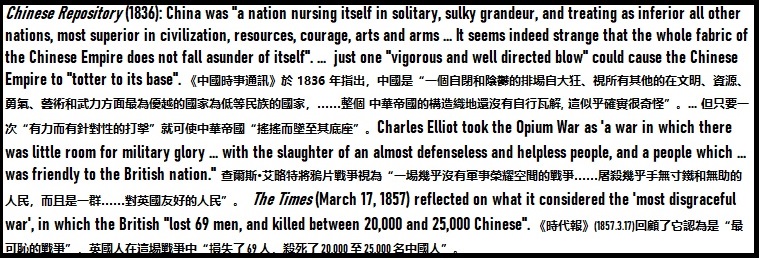
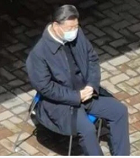








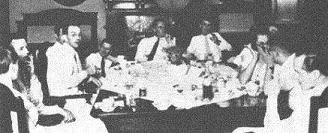
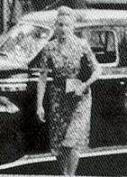
![Though, Anna Wang [Anneliese Martens], in her memoirs, expressed jealousy over Gong Peng by stating that the Anglo-American reporters had flattered the Chinese communists and the communist movement as a result of being entranced with the goldfish-eye'ed personal assistant of Zhou Enlai](GongPeng.jpg)








